#its not in character for him!! most of harry's skills are all more human-like than this. orugh this is so hard :']
Text
accidentally making all of kim's skills fantasy creatures. Kinetic Dressage is a centaur, Volta do Mar is a siren/angel thing, and now Vice is a genie. this doesn't make sense for his character!! stop this immediately!!
#ourgh!! kim would have skills that look more normal than harry's i think. more wispy than anything. but no. we got a horse. ourhg.#its because dressage refers to a horse competition!!! and volta is about returning from the sea!! and vice is keeping wishes trapped!!#and its SYMBOLIC BUT ITS NOT FITTING FOR KIM!!! RAUGH...#it would be funny and i could make it work somewhat if i make it so all the skills think they're so fucking normal. theyre all these#mythical beings but theyre like ''no dont think about that. we're normal. don't look at our wings and hooves and shit we're so normal.''#but still no. it feels wrong. i dont know what im doing u-u i have to think about what makes sense for him and this isn't doing it justice#ourgh. i want to make them eccentric enough to be skills but i dont want them to be like. too fantastical. it just wouldnt make sense#its not in character for him!! most of harry's skills are all more human-like than this. orugh this is so hard :']#originally these had much more self-deprecating tags but i realized it's probably because its late and im tired so im cool im chillin.#chemi chats
9 notes
·
View notes
Text
“Genius is no guarantee of wisdom,” says government official Lewis Strauss (Robert Downey Jr.) in Christopher Nolan’s Oppenheimer. It could be the blockbuster’s banner statement. Since the release of Nolan’s thrilling, bombastic film, the culture has been caught in the firestorm about how to explain the personality of the eloquent, esoteric J. Robert Oppenheimer and his creation of the first and only people-destroying atomic weapon to be used against civilians. Where Hollywood traffics in Oppenheimer’s ambiguity as a historical character, two small but potent nonfiction forebears ask a more pointed question: what is the responsibility of scientists to their societies?
The Day After Trinity (1981) and The Strangest Dream (2008) evacuate the mythical tropes of the tortured genius biopic that Hollywood loves to rehearse in films like The Imitation Game, Hawking, and A Beautiful Mind. Now enjoying a renaissance, the films are neither unforgiving nor hardline, but offer sharper moral clarity to the Oppenheimer dilemma, presenting a more complex (and condemning) portrait of the father of the atomic bomb: a patriot, philosopher-king, skilled public administrator, scientific collaborator with military and government, emotional naif, egotist, and polyglot.
Nolan’s story arcs towards Oppenheimer losing his naivete upon realizing that he has given humanity the power to destroy itself. Designed to wrap around each filmgoer’s own worldview and politics, the film is as politically open-ended as you might expect from a major blockbuster. In his press tour, Nolan articulated a more explicitly conservative stance that chimes both with the Great Man theory of history (another biopic favorite) and the Cold War military doctrine that justified the development and use of atomic arsenals against civilians.
“Is there a parallel universe in which it wasn’t him, but it was somebody else and that would’ve happened?” Nolan said in the New York Times. “Quite possibly. That’s the argument for diminishing his importance in history. But that’s an assumption that history is made simply by movements of society and not by individuals. It’s a very philosophical debate…. he’s still the most important man because the bomb would’ve stopped war forever. We haven’t had a world war since 1945 based on the threat of mutual assured destruction.”
That’s also the idea behind the official policy of the nuclear superpowers: deterrence. Horror, in other words, was necessary to prevent even greater horror. The very same doublethink led to Harry Truman’s honorary degree, conferred for ending the war.
How reluctant was Oppie? In Jon Else’s The Day After Trinity, a documentary originally made for public television in 1980, Oppenheimer’s collaborators deliver ambivalent, guilty testimony to a static, non-judgmental camera. Screening on the Criterion Channel, Else’s doc points to the great pleasure its subject took in being appointed the leader of the grandiose bomb project, with the cosmic job title of “Coordinator of Rapid Rupture.” The lens pans patiently across grainy, grayscale photographs that have the natural air of science fiction; the film feels more of a piece with Chris Marker’s La Jetee (1962) than a typical historical documentary. After all, Oppenheimer was not just the enabler of the weapons that could annihilate us all, but of the high-stakes hallmarks of modern spectacle itself. The awe-inspiring images of mushroom clouds over Trinity, Hiroshima, and Nagasaki are now instantly recognizable in the core visual grammar of contemporary entertainment and media. It’s hard to imagine an idea better suited to Nolan’s exalted, maximalist esthetic and his stories of obsessive male protagonists pressurized within towering patriarchal systems of power.
Oppenheimer positions the atomic bomb as the creation of a brilliant, creative personality. But The Day After Trinity revels in the administrative scale of the Los Alamos project necessary to make a mechanism to trigger, in a millionth of a second, a violent chain reaction with a flare brighter than a hundred suns. A walled city of six thousand staff, at a cost of $56 million. Seven scientific divisions: theoretical physics, experimental physics, ordinance, explosives, bomb physics, chemistry, and metallurgy. All of America’s industrial might and scientific innovation connected in this secret lab with its billions of dollars of military investment.
“Somehow Oppenheimer put this thing together. He was the conductor of this orchestra. Somehow he created this fantastic esprit. It was just the most marvelous time of their lives,” says Freeman Dyson, a rather eccentric theoretical physicist who became Oppie’s colleague at the Institute for Advanced Study in Princeton. “That was the time when the big change in his life occurred. It must have been during that time that the dream somehow got hold of him, of really producing a nuclear weapon.”
In this vision of the A-bomb narrative, Dyson posits that Oppie’s aims switched from finding out “the deep secrets of nature” to producing “a mechanism that works. It was a different problem, and he completely changed to fit the new role.” We begin to see more clearly a portrait of an outsider with a wild desire to be at the center. All the work the whiz kids were doing over the years was always designed to contribute to the war. (All the films remove Oppie’s more demonstrably radical tendencies, his belief in a world government, for instance, which he mentioned offhandedly in the New York Review of Books in 1966.)
The closest we get to Oppenheimer himself is his pale-eyed, doppelganger brother, Frank, who gives the impression of a visionary living in a purely abstract realm. He stammers a little when he speaks of the moment when he and Oppie heard on the radio of their great bomb in action. “Thank God it wasn’t a dud… thank God it worked… Up to then, I don’t think we’d really, I’d really, thought about all those flattened people.” He still seems stunned. If nothing else, Frank gives weight to the storytelling trope of scientists as hyperintelligent but flakey space cadets at a remove from the humanity of it all. “Treating humans as matter,” as Los Alamos collaborator Hans Bethe puts it appallingly. Another contributing scientist says he vomited and lay down in depression. “I remember being just ill,” he says. “Just sick.”
The doc swirls with clips accumulated from Los Alamos Scientific Laboratories, National Atomic Museum, American Institute of Physics, and Fox and NBC newsreels, while Paul Free’s authoritative narration hovers like an omniscient voice from the depths of the Cold War itself. Then, there is Oppie: a figure of stricken elegance in his rakish pork pie hat. Typical of documentaries constructed in a postmodern style, what it all means is never explicated. Ambiguity presides over clarity.
Most directive is Dyson’s testimony. “He made this alliance with the United States Army and the person of General Groves who gave him undreamed-of resources, huge armies of people, and as much money as he could possibly spend in order to do physics on the grand scale,” Dyson says with his flashlight perceptiveness. “We are still living with it. Once you sell your soul to the devil, there’s no going back on it.” Los Alamos, in this counternarrative, was not just an ivory tower but an irresistible paradise for genius-level scientists simply interested in new discoveries and mega-gadgets.
Dyson is a dubious fellow to emerge as the truthteller, given the inconsistency of his own legacy. His unorthodox theories are worthy of their own Nolan-esque treatment. He advocated growing genetically modified trees on comets, so that they might land on other planets and create human-supporting atmospheres, and eventually became a climate change denier based on his distrust of mathematical models. But his intelligence is irrefutable, and his distance from the Manhattan Project gives him a guiltless perspective and authority absent in Oppie’s other colleagues. Dyson, a greater antagonist than can be found in any mere Marvel movie, diagnoses Oppie as the self-induced victim of a “Faustian bargain.”
“Why did the bomb get dropped?” Dyson asks, his tie a little too big, his combover a little too combed over. “It was almost inevitable. Simply because all the bureaucratic apparatus existed at that time to do it. The Air Force was ready and waiting… The whole machinery was ready.”
Dyson also refutes the refrain of Oppenheimer’s responsibility for the catastrophe. “It was no one’s fault that the bomb was dropped. As usual, the reason it was dropped was that nobody had the courage or the foresight to say no.” Dyson pauses to let this sink in, then looks down and wobbles his head tragically. “Certainly not Oppenheimer. Oppenheimer gave his consent in a certain sense. He was on a committee that advised the Secretary of War, and that committee did not take any kind of a stand against dropping the bomb.” This measured oral history is fatal to the view of Oppie as a gentle humanist.
Dorothy McKibben, who ran the Manhattan Project’s office, chimes in with crystal clarity: “I don’t think they would have developed that [bomb] to show at a garden party. I think they were going to do it.” In archival footage, General Leslie Groves plays the role of plainspoken pragmatist: “It would have come out, sooner or later, at a Congressional hearing, if nowhere else, just when we could’ve dropped the bomb if we didn’t use it. And then knowing American politics, you know as well as I do, if there had been an election fought on the basis of every mother whose son was killed after such-and-such a date, the blood is on the hands of the President.”
Through these testimonies, the convention of the conflicted scientist and the myth of an A-bomb created in self-defense give way to a mantra of winning the war, and winning quickly. Valuing American lives over other lives. Avoiding a bloody invasion of the Japanese mainland. Months before Hiroshima, orders had been given to leave several Japanese cities untouched, to provide virgin targets where the impact of the new bomb could be clearly seen. Afterwards, a scientific team from the US was sent to Japan to study the effects. Footage rolls, in The Day After Trinity, of news clips of hospitalized burn victims.
In films on the Manhattan Project, questions of conscience are commonly seen through the assenting viewpoint—that of the scientists who continued to work on the bomb, even after Hitler’s defeat. One essential perspective is obscured, black-holed in subterfuge, even. Physicist and European refugee Joseph Rotblat made crucial discoveries in the fission process, and went on to specialize in nuclear fallout. He moved to Los Alamos in 1944 but defected from the project on grounds of conscience upon learning that the Nazis could not build such a bomb. He was the only scientist to turn his back.
“If my work is going to be applied, I would like myself to decide how it is applied,” Rotblat says in the 2008 Canadian documentary The Strangest Dream. Streaming on the National Film Board of Canada’s platform, the film traces his renunciation of A-bomb development and his role in the Pugwash Conferences, where scientists and statesmen gathered to discuss the reversal of nuclear proliferation. The film renders a fairly straight treatment of its quiet subject, with the visually rich backing of a vertiginous collage of disparate forms, including spooky Cold-War era footage and clips of the Trinity mushroom cloud. Oppie is not in the film, but the narrative takes place in the fissures he helped wrench open; he lurks like an ever-present ghost behind the character of Rotblat, who stands as his angelic nemesis as he tries to transform physics into a humanitarian project. Like Oppenheimer, Rotblat was also accused of espionage, but he was eventually awarded a Nobel Peace Prize for his contributions to the disarmament campaign.
Notably, Rotblat is entirely absent from Oppenheimer, despite being described as a brilliantly offbeat individual—a “mad Polish scientist”—by a former student in The Strangest Dream. It’s a curious historical erasure and a missed chance for a dramatic clash. Then again, perhaps Rotblat is too steady and untragic, incorruptible and unmemeable for his own big moment, let alone the blockbuster treatment. Oppie’s genius wasn’t just in his Faustian bargain but in the way that he spoke and the way he held himself, quoting Hindu philosophy and smoking till the end of time. I suppose film culture is more interested in the flawed, tortured luminary than the staunch, principled dissenter or the morally engaged scientist.
Prosecuting the melancholic drama of the ingenuous mastermind requires substantial historical selectivity. Most cinema narratives hew to the oft-cited rationale for the A-bomb’s development: its function as a deterrent to a Nazi explosive. But in his essay “Leaving the Bomb Project,” Rotblat wrote, “Groves said that, of course, the real purpose in making the bomb was to subdue the Soviets… Until then I had thought that our work was to prevent a Nazi victory, and now I was told that the weapon we were preparing was intended for use against the people who were making extreme sacrifices for that very aim.” With more than a dash of elegiac melancholy, the working thesis of The Strangest Dream is that Rotblat’s moral strength insulated him against Oppie-style tragedy.
Insofar as the The Strangest Dream and The Day After Trinity position the Manhattan Project as an unholy alliance of physics and the openly violent arm of the state, they do so via the absent presence of Oppenheimer, who, flush with government cash, personifies the uneasy collision of science and military. Today’s ventures in AI offer the same science-ethics conundrum, and we don’t seem to be any closer to resolving it than at the moment of Oppenheimer’s mythic quandary. Looking at the images of the Los Alamos exertions, you can almost faintly hear the words of today’s STEM bros: disruption, innovation, brilliance. Wondrous and diabolical, the A-bomb is presented in these documentaries as the freakish outcome of public-bureaucratic entrepreneurialism. (They are weaker on the tangled history of superpower competition and atomic technology.) It all depends, of course, on what humans do with the technology we develop.
Given what we know about capitalist society at present, things aren’t exactly looking up. Just a decade after The Day After Trinity, the Cold War victory lap was being run at the box office. A new, end-of-history generation of studio filmmakers was writing a euphoric, Fukuyama-esque version of reality into pop-culture lore: in blockbusters like Independence Day (1996), The Core (2003), and Armageddon (1998), American pluck saves humanity from wholesale destruction; anxiety surrounding US dominance over the international order is undetectable, and the US military is either prominent or necessary. Before them all, The Day After Trinity suggested that technology’s triumph is the very crux of the problem.
Today, Oppenheimer reifies a political crisis—superpower competition for atomic arsenal—as a conundrum of personality, tech, and naive genius, even as it centers the wild fraternity of science, military, and government vital to create the A-bomb. But the political arrangement of power and resources seems like more of an objective, inevitable fact about the world in The Day After Trinity and The Strangest Dream. If there’s such a thing as sober, mournful spectacle, these films manifest it.
Oppenheimer is long gone, but his legacy—the capacity of a self-destroying humanity, and the late-capitalist spectacle of that mushroom cloud’s bright flash of light—lingers. He did not sign the Einstein-Russell Manifesto against nuclear war. He never apologized for his role in bringing the bomb to life. Atomic technology is now standard. The world’s nuclear powers currently possess an estimated 12,512 active warheads. More than enough to wipe out the planet.'
#Oppenheimer#The Day After Trinity#Frank Oppenheimer#The Strangest Dream#Einstein-Russell Manifesto#Christopher Nolan#Lewis Strauss#Robert Downey Jr.#The Imitation Game#A Beautiful Mind#Jon Else#Los Alamos#Freeman Dyson#Hans Bethe#Institute for Advanced Study#Princeton#Leslie Groves#The Manhattan Project#Dorothy McKibben#Joseph Rotblat#The Core#Independence Day#Armageddon
4 notes
·
View notes
Text
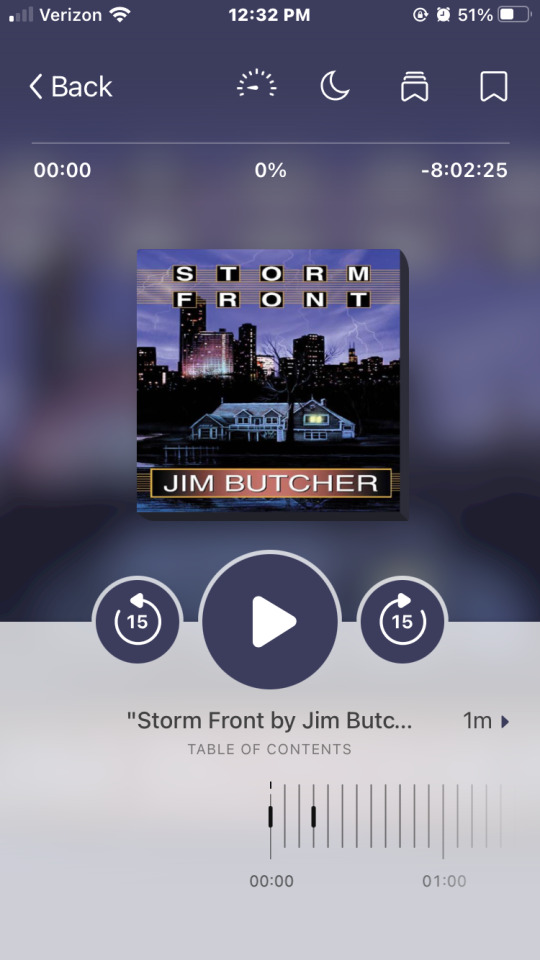
Title: Storm Front (Audiobook)
Author: Jim Butcher
Genres: fantasy, mystery
Source: libby ebook (audiobook)
Rating: ⚡️ ⚡️ ⚡️
Comments: i wasn't sure how best to get the photo for this post, since even though i checked the audiobook out on my phone i ended up listening through the libby site on my computer instead. another reason to hate libby since it was so unresponsive and took ages to play or pause whenever i clicked the button. anyway, i figured the phone version is easier to read and has less wasted width space than the computer version, so i'll slide by on this technicality since it ultimately looks nicer. as for the book, it served its purpose of being something to listen to while minecraft tunneling pretty well. i liked that the magic seemed so large and that there was more to how it all worked than what was shown. alluding to the other parts in motion made the depth of it feel realistic. i thought the description of the crime scenes was cool (in a kind of gross horror way) and though i got lost at a point or two, i was still able to follow the investigation of the mystery pretty well. i felt kind of disappointed overall about the characters; the ones i liked the most or wanted to see more of were given rather little time in the spotlight and got harsh treatment. i wasn't really a fan of the main character even by the end of the book. every time i started to come around on thinking maybe he wasn't so bad, he'd go out of his way to say or do something sexist, homophobic, or just generally kind of creepy. he's clever and skilled with his magic, so it's interesting to see how he confronts problems, but when he's spending time with any of the many attractive women he encounters during the investigation he can't seem to go a single conversation without being a sleaze. the double standard of harry saying/doing sexual things or describing these women in a very sexualized way and this is supposed to read as him being cool or suave or an otherwise generally good character trait compared to the women characters who pursue sexuality being attacked or shamed or straight up killed throughout the story... this is the point in my review where i grab the author by the shoulders and shout as loud as i can, "be normal about women!!!!!!" i was told recently that the series starts getting good around the third book, and i really hope that also includes this aspect. it has the potential to be cool and has good enough worldbuilding bones that i kept forgetting it was set in chicago. i do plan on continuing to listen since i've still got more tunnels to dig, but i don't know that i'd recommend this book based on the standalone experience i've had with it. if the rest of the series improves or otherwise earns my trust, then yes. if every sympathy point earned contiues to be quickly redeemed for a grating yuck moment, then no. we'll see! i will say that it was fun to listen to as an audiobook though, and i got a smile whenever the reader (actor?) took a word at an unusual pace or mispronounced something or at one point creaked a chair in the background. it just made it feel very human and like the story was being told to me rather than beamed into my brain. it's a nice sense of connection that isn't a part of visually reading a text and i wasn't expecting to find here!
0 notes
Note
Hiiii 💖 I love your writing and I was wondering if you would ever consider writing something about H dating a plus sized model or something along those lines. It makes me sad that everyone here describes their characters as 'much smaller than H' or mention their size difference in a way that makes it look like H is so much bigger because that's not relatable to all of us 😔
hi babygirl 💞 as someone who is chubby as well, I understand the struggle. i know there are some great plus size Y/N stories out there (unfortunantly i don't remember the authors or the titles rn, but if anyone knows any i would love to share) but your ask actually inspired me and i wrote a little something something, which is not that great but i'm gonna post it for you anyway.
here is a very small blurb of CEO Harry having v big crush on his brand-new employee Y/N.
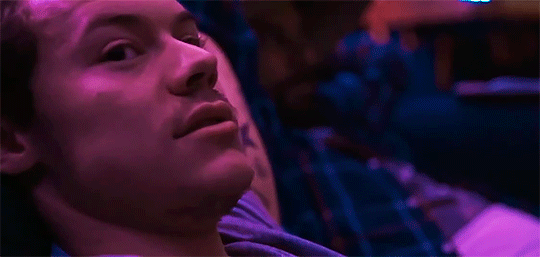
**
Harry is going insane.
And it’s all her fault.
He doesn’t know what it is about her.
In the least asshole-y way of saying it, she doesn't fit with his usual standards. No, not even close. From his younger years up until this point in his life, Harry has consistently gone for conventionally attractive, usually on the skinnier side, type girls in terms of who he wanted to date or fool around with. Mostly because dating such-like women went straight to his ego. There was nothing quite like walking into a room accompanied by yet another Karlie Kloss lookalike and watching as all the other men began to drool like starving beasts over what was his. He got off on it - the greedy eyes, the shameless glances, that were usually followed by indiscreet pats on his back that aimed to let him know he had it good, as if he didn’t know that already.
It made him feel great about himself – successful in a way. He was more than glad to let everyone in on the fact that he had the perfect life. The perfect business, the perfect car, the perfect girlfriends.
So, when did that stop being enough to make him happy?
The answer comes to him easy – Y/N.
She’s one of the company’s most recent hires - technically his hires. But he won’t take credit for it, after all he wasn’t the one who interviewed her or decided she got to have the job. That's what the human resources people are for -it’s why he’s paying them after all. Still, he had taken a brief look at her résumé. It was nothing too impressive… plain average for someone her age, but Margaret, who had conducted her job interview, insisted that she had showed great communication skills and seemed very eager to work for their magazine. Her résumé came with a good professional photo of her pretty face as well, what admittedly caught Harry's attention on the spot… although he later found out that the picture didn’t even do her justice compared to the whole package in person.
Y/N is curvy and plumpish everywhere.
The flesh on her thighs jiggles when she runs around the office in her adorable dresses and skirts, her soft tummy pudges whenever she sits down, and the pants she wears never seem to fit her body quite right. She's always fixing them, he had noticed. Either by pulling them up at the waist or pinching at the leg fabric so that it falls to its right place.
But never once has Harry thought she was lacking in some way for those things, or that she would be better not being exactly the way she is… in fact, he thinks she couldn’t be any more perfect.
He also likes her style a lot.
It's special and distinctive like her, and Harry would be lying if he claimed that he didnt purposefully look up from his computer every time he heard the hurried steps of her chunky loafers going around the corner just so he could catch a glimpse of her through the office’s glass partition.
Harry is a big fan of loafers too, but he believes she owns even more than he does. Cheaper ones too, but he thinks they’re cute none the less - and she likes to combine them with ankle socks sometimes, in a 50's collegial prep retro fashion, what truly doesn't help Harry’s fantasies of taking her over his desk the slightest if he’s honest.
Often times now, he finds himself scrolling through the women's section of the expensive designer boutiques he shops at, trying to make out which pairs she would like or dislike. Somewhere last month he had seen some unique-looking, square-toed black ones that he thought were right up her alley… so much that he struggled a bit to come up with reasons not to get them for her - she could use a new pair… her black ones were already a bit worn on the soles and wrinkled at the edges, as they were the pair she wore the most.
But no matter how much he wanted to, Harry couldn’t possibly justify getting a pair of $300 shoes for one of his employees – let alone one of the newest ones to whom he didn't owe anything aside from basic professional cordiality yet. He wouldn’t think twice about it if she were his girlfriend, or one of his regular fucks – but not even those last ones get to receive gifts from him, unless he is feeling particularly generous, or needy for that real cheesy relationship stuff.
But ever since he found Y/N, he only ever craves to experience cheesy relationship things with her.
It’s driving him mad.
He has to find a way to make her his girlfriend.
And definitely not just because he wants to get her those bloody loafers.
I did a PART 2 🐿️
#im sorry if this is shit#i know its very stereotypical and i lowkey feel like i did a poor job at this but idk#harry styles writing#harry styles fanfiction#harry styles blurb#ceo!harry#harry styles fanfic#im thinking it should be fun to write a full plus size yn fanfic in the future btw - cuz now i got much better ideas in my brain 👀
766 notes
·
View notes
Note
Please share the receipts about Harry Potter being a colonial fantasy! Reading stuff like that is so interesting 🙈 have a good day

I’m glad you both asked!
This argument will be divided into threemain parts. The subject of magical creatures in the wizarding world, thesubject of humans other than English wizards, and the subject of Harry’scharacterization in the novels. But before I can discuss the novels andRowling’s (probably mostly unintentional) colonial fantasies, we must look atthe background information of those colonial fantasies. To do that, I willoutline and explain certain elements of the 1800-century cultural and politicalsituation, reflected in the literature of the time. (See! This is why you don’tdismiss history as the unnecessary boring subject Rowling!!!!)
(In this text, I use the word wizard akin tothe universal man, as in mankind. I do this, because Rowling herself does this,referring to unisex groups of witches and wizards as “wizards”.)
Racial thinking in the British empire was heavily influenced by pseudo-scientific theories like phrenology and race classification theory. Humanist sciences like sociology were heavily influenced by “hard sciences” and there was a strong demand to find a scientific justification for the existence of the empire. This justification came with race classification, that was divided into two different equally racist branches of theory. The idea that different human races were actually subspecies inside the human main species, and that these subspecies had evolved to fulfill different functions and behave in different ways. Roughly divided, the Anglo-Saxon subspecies had evolved into a rational thinker and a natural leader, the Asian subspecies into servile and effeminate role, and African subspecies into manual labourer. Now, in order for society to live in perfect harmony, that society has to be built in a way that each human species can follow their natural predilections and follow their species-natural behaviour.
The other branch of scientific sociology argued that all humans had the same potential for civilization, but that all human societies were also in different evolutionary stages. Human societies were seen to evolve in a neat line, from promiscuity-matriarchy-transitional patriarchy-patriarchy. All human societies therefore started from hunter-gatherer tribes and would eventually turn into enlightened British style modern societies. As the British already had reached the top of the societal evolution, it was also their right and burden to protect the societies that had not yet reached this top evolutionary form. It is very important to remember that while the British empire was filled with straight up hateful and vile racists that saw genocide as a fun past-time, there were equally many people who believed the science of the time and condemned the mistreatment of the empire’s subjects believing that the empire was in truth necessary in order to help their less-evolved human compatriots.
Another important note to make about the imperial mindset is how these rational leaders were created; in boarding schools. The future leaders of the empire were all sent to a boarding school, somewhere around the age of 10. These schools, rampant with bullying, pressure and straight up rape, were not places that a young boy was supposed to become a scholar or an athlete; his job was to make connections and learn to become charismatic. Doing too well in your subjects was not desirable, as a book-worm is not what the empire needed. Being good at sports was good, but not if you had to sacrifice time to practice too much. Sports and sciences were there to support the student’s growth into a proper English gentleman, not as an educational goal themselves. Debating, public speaking, and aggressive confidence were much more important skills to master for the future overseer of a colony. Your job as a student in, for example Eton, was to network and grow a stiff upper lip. A terrible educational system for sure, which caused damage to the British psyche that people today are still trying to understand; with Boarding School Syndrome and its consequences important when trying to understand the problems in British politics today
How do these facts then relate to Harry Potter? Well, let’s start working our way through from magical creatures. In the Harry Potter universe, the world is filled with creatures with human-sentience that however do not, at least in Britain, mix with the dominant human population. We know that there are house-elves, working as servants, goblins, working as bankers, centaurs, keeping away in their forest, as do merfolk in their lake. Dwarves were employed as cupids (entertainers) in Hogwarts by Lockhart, and there are veelas that work as exotic dancers in the quidditch world cup.
At first glance, you might think that Harry Potter and Dumbledore are on the side of the creatures. Dumbledore is noted for being a great advocate for non-humans when defending their right to exist, as opposed to the more genocide-minded goons at the ministry. Voldemort is happy to employ creatures that he deems “dark” and ignore the rest. At first glance it would even look like the narrative is advocating for tolerance, and it is, but it is not advocating for equalitybetween humans and non-humans.
The centaurs and the giants have lost their native lands to humans, and have been forced to live in reservations, as most notably pointed out by Dolores Umbridge in Order of the Phoenix. “Ministry of magic permits you certain areas of land.” (p.665) At the same time, the books do not take the time to portray either the giants or the centaurs in particularly sympathetic light from the point of view of our characters and this point of view is never questioned. Centaurs are shown to be violent and even unreasonable towards any humans who would want to have contact with them. Giants are shown to be stupid and hostile, killing themselves into extinction. (Order of the Phoenix p.377) Meanwhile, the races that do mingle amongst wizards all have something to offer to humans who allow them in their society. Goblins are useful to have around because of their hold over the banking industry and their superior metal-working. House-elves are useful as domestic servants. The creatures that wizards label as “dark” are all creatures that do not have any filled role that they can perform for the benefit of humans, (vampires, hags, werewolves), segregated from the wizarding society proper, and are therefore shunned as undesirables. Veelas on the other hand are blatantly fetishized, and they are only shown in two roles in the books. Either as entertainers or as married to wizards. The narrative does not even hint that a veela might have any non-sexual role in the society. It would seem, that all the magical races have either been pushed out of the wizarding community, or they fill some niche purpose in society that the wizards find useful, and that the wizards themselves do not want to perform.This structure of society, built upon the assumption that there will always be creatures fulfilling certain roles for the society, is not questioned by any of our heroes.
Dumbledore is happy to advocate for tolerance, but not inclusion. He is happy to create a dialogue between humans and centaurs- as long as it is not humans who have to make any concessions in their relationship. Same goes for merfolk. Dumbledore advocates for their right to exists in their own segregated patches of land, and in return they will help Dumbledore. Merfolk will allow themselves and their home to be used as obstacles in the tri-wizarding tournament and the centaurs will let wizards traipse through their forest.
Inside the centaur society, we are supposed to see territorial Bane as the “bad guy” and the meek Firenze, who argues that centaurs should take sides in a human war and make defer even more to the wizards. Firenze eventually accumulates into the human society by becoming a teacher in Hogwarts, but only after he has been banished from the Centaur society. Therefore Firenze becomes completely subserviant to Dumbledore, as his own people do not accept him anymore and Hogwarts is the only place he can go. He does not have the backing of his own community that could allow him to make demands towards his human peers, which makes him a good ally for Dumbledore. Firenze placed the needs of humanity above the needs of his own species and that makes him the ‘reasonable’ centaur.
The same happens with goblins. Their prioritization of their own people is at every turn equated with them being unpleasant, unreasonable, and impossible to work with, and when Harry Potter shows the bare minimum of respect- acknowledging that goblins have their own legal system that defines ownership of an object differently than a human would, it is framed as the greatest height of progressiveness that anyone could ever show towards a goblin, instead of the bare minimum. Never-mind the fact that the books explicitly mention that goblins are denied the use of a wand by the dominant human government, and actively have to fight for the rights they have even now, which is neither an interest nor a concern to any of our heroes.
Note of interest is also that most non-humans taking action against the status quo are antagonists. There are no creatures in the order of the phoenix fighting against the dark lord, (Remus Lupin identifies as a human with an unfortunate condition.) but there are several under the command of Voldemort. (Order of the Phoenix p.88) The most positive attitude towards non-humans comes from the heroes who show tolerance towards non-humans, but who also do not try to reach any deeper understanding about non-human experiences in the wizarding society.
The house-elves are the most blatant piece of yikes when it comes to the issue of creatures. The enslavement of house elves is explained away as a natural order of the world. At the end the series, even the protagonist Harry Potter accepts this natural order and becomes himself a master of the house elf Kreacher (Half Blood Prince p.55). Harry’s slave-master position is accepted,because we trust Harry to treat his slaves decently, there is never anyquestion what the condition of being a slave-master can psychologically do tothe master, or that slavery as an institution is too immoral to accept, nomatter the conditions. The reader is shown that the elves are not capable oftaking care of themselves without a master by examples of Dobby and Winky, the only freed elves shown in the books. Winky, after being freed, becomes an alcoholic. (Goblet of Fire, p.564) Dobby, while enjoying freedom, would be unable to support himself without the help of benevolent Dumbledore, to whom Dobby works in the same way as the other slaves in the castle, even if he is namely free. (Goblet of Fire p.400) (Both alcoholism and “frivolity” were anti-abolitionist talking points in the southern states in the antebellum era). Theimplication is that some races are simply born subservient, and the morally decent thing to do is to keep them in slavery but treat them kindly.
Hermione Granger, who in the books argues that slavery as an institution is by itself something that cannot be accepted, is presented with her views as ridiculous and misguided. On the other hand, those who argue for the institution of slavery appear as rational and reasonable. There is no way for anyone to think of her S.P.E.W badges as anything but childish and stupid, a phase for Hermione to grow out of. In Chamber of Secrets, the readers do see Harry freeing the house elf Dobby, after Dobby has personally helped Harry. However, the implication is that Dobby suffered from an unfit master, not from the slavery itself, and that his freedom came as boon after he had done a personal favour to Harry Potter. In the world of Harry Potter, slaves are happy to be slaves, as long as their masters are decent masters.
But if you stop and think of all this, it should not be rationally possible for a society like this to exist. If the giants truly are so stupid and violent that they are accidentally killing themselves to extinction, they should also not be sentient enough for humans to breed (and even create emotional bonds, as Hagrid’s family) with them. If these creatures have managed to create a society, it should not be possible for them to be unable to “understand complicated matters” or “kill anyone who uses too big words” (Order of the phoenix, 429).
Same with the centaurs. Segregating an entire culture to a small reservation is not pretty, and it does not happen peacefully. Still there is never any indication that the wizards were actively doing anything to keep the centaurs in their reservation. Even though, overtly and less-overtly violent actions and policies are in reality always working to keep indigenous populations at check. No creature segregated in their little reservation wants to leave that reservation, choosing to rather waste away amongst their own kind than pushing for their species to either be integrated into the wizarding world, or gaining more land from the wizards. And assuming that the centaur population is too small and weak to do anything but accept their reservation, the heroes do not see anything wrong with this arrangement either. The mythical tale of the noble savage who quietly goes into the good night is real in the wizarding world.
Those creatures who do live and work alongside wizards are equally content with their narrow roles. No goblin wants to work anywhere else expect the bank, no house-elf wants to open a business, no veela wants to study in Hogwarts. Half-breeds might be allowed in, if the headmaster is eccentric enough, and as long as they are able to “pass” as humans. The fact that their creature parents would never have that change is not even acknowledged as the tragedy that it is. It is easy for the heroes to appear as progressive, when the only thing the creatures want is to be allowed to exist in their pre-ordained roles and be treated with the most basic decency.
We don’t know what Dumbledore’s answer would be if a young goblin wanted to apply as a student at Hogwarts. We don’t know what any of our heroes’ reactions would have been, if the centaurs demanded compensations for Hogwarts’ rights to use the Forbidden Forest. Or if Dobby would have started campaigning alongside Hermione for abolition. We don’t know, because the wizarding world is in perfect harmony, as long as the creatures are allowed to exist peacefully in their roles, without corrupt, dark wizards abusing them needlessly.
What about humans then. Not all humans are created equal either. We don’t really see about the state of the wizarding world outside of Britain, but we are given the implication that the political situation in Britain is equal to the fate of the world. Harry Potter is not fighting for a political cause in UK, he is saving the world. British politics are world politics. The international wizards we do see, are also almost as much stereotyped as the creatures are. The French boys and girls from Beauxabatons are vain and frilly, while the girls and boys from Durmstrang are brutish and coarse. And in the European stage, UK and France gets their own wizarding population, while the eastern Europe is apparently lumped together in a way that makes you suspect that the Soviet Union never fell in the magical world. (considering when Rowling was creating these stories, that is not impossible. Rowling started writing Philosopher’s stone a year before the Soviet Union was dissolved). In the world politics, these three are the only ones important enough to be included in the tri-wizarding tournament, (tournament that the British dominate easily), and therefore clearly hold the political cards of magical Europe. What we do know is that British wizards have no trouble finding work overseas, while we do not see any foreigners living or working in the British wizarding world. Britain’s importance as the centre stage of magical world politics is simply a given fact of the world.
(Note that I have decided to omit all nonsense that Rowling has added to Pottermore in her effort to world-build but rest assured that it makes the situation simply much much worse.)
There is also the clean divide between muggles and wizards. The wizards once again are honour-bound from their superior position to protect the muggles. The books make it clear that it was not for the safety of the wizards that the worlds were divided. It was simply that muggles in their ignorance kept burning other muggles during the witch-hunting times. The idea that muggles, if confronted with an existential threat like the death-eaters and their genocidal tendencies, were to win the fight, is not even floated as an idea. The moral implications ofkeeping the muggle world ignorant about a part of UK population that wants to kill them, and has succeeded in several terrorist attacks against the commonpopulation, is not discussed at all. The wizards simply have the right to sacrifice the lives of muggles in exchange of keeping their society hidden from the “common folk”. The wizards who do show any interest in muggles, do it in the most condescending way possible. Arthur Weasley, who has spent years working in the ministry of muggle-affairs, cannot pronounce the word electricity or know what a rubber duck is. How exactly does someone work for muggle-affairs if one is completely ignorant of said affairs? Why are muggleborn’s not automatically working for muggle-affairs? How is it, that muggleborns all simply choose to embrace the wizarding culture without there being any underground muggleborn culture running counter the pureblood establishment? Hermione Granger wants to be seen as one of the witches, not as someone whose cultural knowledge of muggles could in on itself be a strength. Rowling really wants you to believe that the British wizarding culture is naturally so desirable that no counter-cultures have born inside it, or that there ever could be any other problem expect that muggleborns are restricted from accumulating into it.
And then we come to Harry. Our hero. At first look, he appears to be the underdog fighting against the unjust establishment of the wizarding world. However, if one takes a closer look at the story, Harry Potter is not an underdog at all. In the beginning of the story, he acquires a great inheritance from his exceedingly wealthy parents. (Philosopher’s Stone p.85) In every other character exceeding wealth seems to be a negative trait, but curiously Harry’s status as an heir to a fortune is never properly addressed in relation to Harry’s moral character. Harry is also a son of esteemed and powerful magical parents, both highly regarded in the wizarding society. From his father’s side, Harry can claim a connection to an old pureblood house, giving him a claim to the pureblood wizarding establishment. Both the wealth and the bloodline inherited from the Potter family guarantees a place in the upper class of the magical society for young Harry. Even the extremely racist Draco Malfoy in the first book seems eager to make friends with Harry. (Philosopher’s Stone p.120). It is only Voldemort who has robbed him of his natural heritage and privileges and forced him into hiding with his brutish and cruel (muggle) relatives.
The story of Harry Potter is not of someone who fights for acceptance, but of someone who returns to his rightful place on top of the wizarding society. characters who do not naturally have this privilege, gain prestige by being helpful and loyal to Harry. It is a deliberate choice by Rowling to make Harry a heir to an prestigious family fighting for the rights of muggleborns and those lower than him in the wizarding societal ladder. He is the archetypical English gentleman hero, because he has both the privilege and the proper character to carry that privilege. Voldemort, Malfoy, and other “dark-siders” from the pureblood establishment have abused this privilege and are therefore unworthy of it.
Another important part of Harry’s character is that all his powers and abilities that help him champion against Voldemort are either inherited or inherent. Harry does no need to labour for his victory. His mother gives him “blood-protection”, his father and mentors give him magical items to help him on his journey, and he simply has skills that others don’t. His flying abilities making themselves known the first time he hops on a broom, and his inexplicable talent to resist the imperio-curse is never explained expect with “a strong will”. He even learns the patronus, a spell that for adult characters is explained as a very rare and impressive talent, in a matter of days. What he is good at, he doesn’t need to work for, and what he is not good at, he doesn’t need to improve on. If there is something he doesn’t have the innate talent for, he has friends who will do it for him. When Snape claimed that all of Harry’s successes were due to luck and more talented friends…he wasn’t wrong. And the kicker is, that that’s the point. Harry’s main strength is the fact that he is good at networking and having a brave heart. That is the ideal that thousands of young Englishmen tried to mould themselves into during the imperial days. Harry doesn’t need to be the “smartest wizard of his age”, he needs to be charismatic enough that others will follow him into the battle. He doesn’t need to be shrewd, or ambitious, or smart, or even kind, he needs to know how to apply his inheritance correctly and how to manage those in the lower position than him, in order to return the status quo of the wizarding world to what it was before Voldemort.
When both Harry’s already existing place in the magical society, and the question of how the books treat the magical creatures are considered, the main conflict in the book seems to be reduced to an inner struggle between the higher classes of wizarding society. Voldemort and the death eaters are evil because they misuse their power over the lower classes, and because they discriminate against other witches and wizards. Therefore, it is the duty of Dumbledore and Harry Potter to return the wizarding world to its former and rightful order. The narrative supports the idea that now that the proper people, the naturally noble-minded heroes, are once again in power all the social issues of the wizarding world will disappear. Those on the top of the social pyramid will treat those under them with tolerance, and those at the base of the pyramid will stick to their place.In other words, the world of Harry Potter has fulfilled the colonialist fantasy of the British empire, where everybody has their place in society, and the inferior races truly are without ambitions or nuances.
The wizarding world has the structures that the British empire had, but none of the problems that come with those structures. In the end, the wizarding world returns to peace. “all was well.” The house-elves are given laws that punishes a master that mistreats their slave. The goblins continue in their segregation. The centaurs and merfolk are given a promise of no genocide. The British muggleborns are promised a place in the dominant society, as long as they perfectly emulate their pureblood peers and don’t bring muggle culture (or values) with them. The superiority of British wizardingkind has been proven, and they benevolently reside over their less evolved subjects, making sure that they are allowed to fulfill their roles in the society, as they naturally desire, in peace. There are no troublesome creature-rights activists causing havoc on streets. There are no muggleborns who would wish to side with muggles against the wizards. There is no empire, there is only the natural order of things.
Bibliography
https://www.academia.edu/26667941/Crowning_the_King_Harry_Potter_and_the_Construction_of_Authority
https://www.lib.latrobe.edu.au/ojs/index.php/tlg/article/view/162/161
https://kb.osu.edu/bitstream/handle/1811/24083/H_and_F_book4print_final.pdf;sequence=1
https://www.verywellmind.com/what-is-phrenology-2795251
https://www.gresham.ac.uk/lectures-and-events/the-victorians-empire-and-race
https://en.wikipedia.org/wiki/Johann_Jakob_Bachofen
https://kenanmalik.com/2014/05/15/the-forgotten-roots-of-the-first-world-war/
http://historymatters.gmu.edu/d/5478
https://www.naturepl.com/stock-photo-tableau-to-accompany-professor-agassiz-opening-sketch-on-the-image01388344.html
https://until-darwin.blogspot.com/2012/09/darwin-slavery-species-question.html
https://www.britannica.com/topic/race-human/Scientific-classifications-of-race
https://www.vanityfair.com/news/2008/11/hitchens200811
https://newrepublic.com/article/151232/britains-boarding-school-problem
https://www.theguardian.com/education/2014/jun/09/boarding-schools-bad-leaders-politicians-bullies-bumblers
https://anotherwasteland.blogspot.com/2008/05/robinson-crusoe-colonialism-and.html
https://neoenglish.wordpress.com/2010/10/17/colonialism-in-victorian-literature/
https://www.pbs.org/wgbh/aia/part4/4h3141t.html
#harry potter#Anonymous#long post#literary analysis#ask and you shall receive much more than you ever wanted
8K notes
·
View notes
Text
Breaking Writing Rules Right: "Don't Write Direct Dialogue!"

Over the years, I've done a lot of posts on dialogue, in part because when I went searching for a deeper understanding on the topic, I didn't find a lot of material. One of the recurring things I did find though, was about writing indirect dialogue. And this is absolutely one of the best places to start, when learning how to craft better dialogue. Dialogue should always be saying and doing more than what's on the page.
Almost always, anyway.
Naturally, this means incorporating indirection.
Which plays closely into subtext.
But a few times I've been asked, when is it okay to use direct dialogue? For this post, I have at least four answers.
What's the Rule?
Don't write direct dialogue!
Why it's a Rule
Usually the best dialogue considers what the character doesn't say, and how. In other words, subtext. When subtext happens, the dialogue is bigger than what's on the page--a quality that seems to be key to drawing in readers and writing a great story.
And in reality, most of us do talk indirectly. And we are always revealing more about ourselves than what we say (whether or not we want to). Interestingly, the more powerful emotions we feel, the more indirect we tend to be.
Indirect dialogue also holds more tension. (This again draws us in.)
On the flip side, direct dialogue releases tension, something we rarely want to do.
And when we talk about powerful emotions directly (and disproportionately), they can actually lose power. This is one of the many facets of the "show, don't tell" rule. Talking about powerful emotions directly in dialogue, labels, or in other words, "tells" them, which usually is not as satisfying as showing them so they can be experienced by the reader.
Direct dialogue also means one-dimensional dialogue. What you see (or read), is what you get. This turns the reader into more of a spectator, instead of a participator, in the story (and we want participation).
But a lot of beginning writers write direct dialogue--we probably all did. Writing indirect dialogue is a skill--it takes study and practice (and more practice).
In case anyone isn't quite sure what I mean about direct vs. indirect, here is a quick example:
Direct:
"You're an idiot, Shelly," Jasmine said.
Indirect:
"You wouldn't know this, but I don't do much writing anymore," Jasmine said. "Those days are over. I use what are called 'ghost writers,' Shelly. People I hire to do the writing for me. I like to sit back and brainstorm a few concepts with a glass of champagne. Do you know what 'brainstorming' is?"
"Yes," Shelly said.
Jasmine simpered. "You're smarter than I was expecting."
In the second example, Jasmine implies she thinks Shelly is an idiot in the way she talks to her (in bold).
I realize this example takes up a lot more space--and sometimes being indirect does.
But, as the story builds upon itself, strengthening context, you can be clearly indirect in less space. For example, if the reader went into the scene knowing that Shelly is a world-renowned writer and that Jasmine is stuck up, then a line like "Do you know what 'brainstorming' is?"--is all we need. (Obviously Shelly knows that, so Jasmine saying that is like slap in the face.)
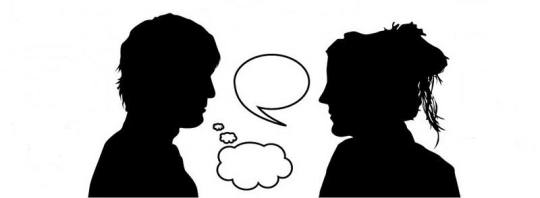
When to Break the Rule
The majority of dialogue should be indirect. That's just the way it is. But that's not necessarily the same as never being direct. So when is it a good idea to say it like it is?
1. When You Want to Release Tension
Indirect dialogue holds tension.
Direct dialogue does not.
When you move from indirect to direct, it releases tension.
And sometimes that is exactly what you need.
It's the same thing in story structure. You start with your hook and introduction, go to the rising action and climax, and finish it up with the falling action/denouement. Or to put simply: introduce tension, build tension, release tension.
The denouement is all about releasing tension--that's why loose ends are tied up (generally speaking).
Releasing tension isn't bad, and if it is done at the right time, can be highly effective.
And that may not be necessarily during the denouement.
Because, as I talked about in this post, that story structure permeates all parts of story (like a fractal), not just the overall plot. Scenes, conversations, even descriptions, have that structure. This means that some direct dialogue may be just what you need after you've introduced and built up tension.
Consider a conversation where two people in a relationship are arguing over dirty dishes. While they might be fighting about dirty dishes, perhaps the real argument (subtext) is about one partner thinking the other might be cheating. Either context or indirectness introduces that idea. And it builds and builds and builds as the fight goes on and on. But for your plot, you don't plan on carrying this conflict through the entire book, maybe only this scene. So, after the conversation reaches its high point, one partner says to the other, "Just like you've been cheating on me with your secretary!"
The other says, honestly, "I haven't been cheating."
And then perhaps through direct dialogue, the problem is sorted out.
During a denouement, not only are loose ends tied up, but changes and ideas are validated and a "new normal" established. So, here in this example, by now talking about cheating directly, it will validate each person's concerns and they can start a "new normal" (one that doesn't include someone thinking the other is cheating).
You've seen similar dialogue arcs before. Perhaps there is sexual tension between the protagonist and love interest, which builds and builds and builds, until one tells the other directly that they love them. And in most stories, that's when the two starting kissing. Both those things are part of a denouement, even if it's not during the denouement.
So when it's time to let go of tension and start a falling action, direct dialogue may be just what you need.
But, I do want to note, it's also possible to hit that falling action without direct dialogue. Say, in the text, the main character intentionally tells the love interest she loves him, indirectly, but it's clear to both of them exactly what she is confessing, so in a strange way, it's direct and indirect simultaneously. But let's not confuse ourselves too much.

2. When Being Direct Adds Tension
In the above examples, tension is released--but only if having an open discussion about possible infidelity or being in love doesn't lead to new, immediate potential conflicts.
Remember, conflicts are problems happening.
Tension is the potential for problems/conflicts to happen.
If we already know that two characters can't be together because a romance will lead to them losing their jobs, which they both need critically right now, then in some situations, one directly confessing love to the other, introduces more tension. It's similar to the "Yes, but" idea--if you are familiar with that writing term.
Yes, the character got what she wanted . . . but now she's going to lose her job, which will create even bigger problems.
In other words, it adds tension.
But, keep in mind, that to some degree, the prior tension is released, if only a little or temporarily (at least until the end of the scene).
Because, say they both want to keep their jobs, so ultimately decide not to see each other. Well, the tension was released during that confession, but in the next scene, we have heightened sexual tension--because each knows the other loves them, but can't act on it. (Leslie Knope and Ben Wyatt's relationship in Parks and Rec is a great example of this sort of thing.)
Keep in mind though, however it plays out, the confession still works as a sort of denouement, because it validates and establishing a new normal (either losing jobs or dealing with heightened attraction).

3. When The Character is Direct
Some rare characters are very direct. It's just part of who they are. But that also means they come pre-packaged with their own kind of writing challenges.
Luna Lovegood from Harry Potter is a great example of this. She almost always speaks directly. But this is because she has nothing to hide. As Rowling once put it, "She doesn't give a d--- what others think of her." So it's not like she needs much subtext.
In one of my ongoing projects, I have a viewpoint character who is similar. Part of me wishes I knew what I was getting into when I started with him, but then part of me is glad, because then I might have picked someone safer. Needless to say, he's been one of the most challenging characters I've tried to write.
You see, the thing with having direct characters, is they lack the usual avenues of tension and conflict. If they are direct, and don't care about being direct, then a lot of techniques you have at your disposal with other characters, are gone. (It took me some drafting to figure out how to work through this.)
But even if your character is direct, you still need to incorporate tension. We've talked about this a bit in the last section, but for characters like this, you need to look at how being direct causes tension, conflict, and complications.
Think about it.
If you were direct about everything you thought and felt, and in the way you shared that, what would happen?
A nightmare! That's what would happen.
This is one of the reasons we as human beings aren't direct in our speech in real life. (And how many children have been labeled rude or hurtful for saying exactly what they think?)
This sort of thing happens with Luna, although it's tamed down somewhat in the films. In the books, she's regularly getting in arguments with Hermione. Why? Well, in part because Luna says whatever she thinks and believes and doesn't care how Hermione responds. Her directness leads to people feeling uncomfortable, awkward, and is one of the reasons she's an outcast; translation: complications.

4. When Something is Urgent or Somewhat Unimportant
When characters are in an urgent situation, they are more likely to talk directly. It saves on time. So something like, "Look out! A cliff!" obviously works. It seems like common sense. How many times has a character thought he was about to die, and made a point to confess his guilt, love, or feelings directly, right in that moment? When it looks like your world is falling apart before your own eyes, there might not be much time to be indirect--and there may be a sense of desperation to be direct.
Worth noting is that the less we care about something, the more direct we might be. If it's unimportant to me that I ate a hamburger for lunch and you ask what I had, then I'll have no problems sharing that. If I'm supposed to be an a vegan diet, then I might try to dance around the answer.
Usually in manuscripts though, we cut way down on the unimportant--things like small talk and basic introductions often get axed, unless there is subtext within. Which then usually makes them important, anyway.
Both urgency and importance/unimportance also play into the story's pacing. So that's something to keep in mind.

So is it always bad to write direct dialogue? Nope! But just like "show, don't tell," your story will be better off if the dialogue is more indirect than not.
Related Posts:
5 Most Common Mistakes in Dialogue
Writing Realistic and Complex Dialogue Kicking "Great" Dialogue up to "Killer" Dialogue Breaking Writing Rules Right: "Only Use 'Said'" Generic Dialogue—Staaaahp (Don't) Tell Me How You Really Feel
How to Punctuate Dialogue
Writing Callbacks
#writing tips#writing tips and tricks#writeblr#nanowrimo#dialogue#writing#writing help#writing reference#writing dialogue
1K notes
·
View notes
Text
the many faces of tom riddle, part 2
-you dislike frank dillane’s portrayal of tom riddle only because you don’t think he’s attractive-
FULL DISCLAIMER THAT THIS IS JUST MY OPINION OF A CHARACTER WHO DOESN’T HAVE THE STRONGEST CANON CHARACTERIZATION, AND THUS ALL THIS IS BASED ON MY CONCEPTUALIZATION (and this time, featuring a bit of armchair child psych from a student).

Wait, don’t clutch your pearls just yet. Compose yourself.
I am about to explain why it’s not actually that bad, and Dillane’s portrayal is vastly underappreciated.
I definitely agree that his portrayal comes off as ‘creepier’. It’s not helped by the stylistic decisions in the scene -- the smeary, green filter gives the scene a sinister quality.
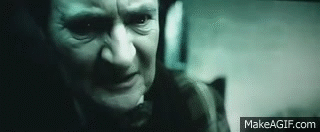
Even Slughorn looks suspect here, which is somewhat appropriate, given that he is complicit in this crime.
Again, this scene is very much intended to be slightly off.
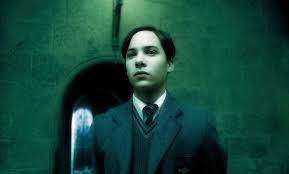
You’ll notice (and I’ll discuss this again when I talk about Coulson’s portrayal) that Dillane is almost always shot from at least slightly below, which makes the lower third of his face look bigger (and thus more menacing). The lighting also makes his eyes glow in a really unnatural way. There’s an echo-y effect to make his voice (and not Slughorn’s) sound unnerving.
People talk about how Coulson would have looked in this scene, and if he was filmed in the same way (monotone, smeary/shadowy filter, and always from below), he’d look a bit creepy, too.
But all of this, imo, is for a pretty good reason. Slughorn isn’t the POV character. Harry is. Harry is learning about how a young Lord Voldemort wheedled the secret of Horcruxes out of an unsuspecting teacher. Unlike in COS, he expects Riddle to be evil. And, so, Harry’s new perception of Tom Riddle literally colors how we perceive him.
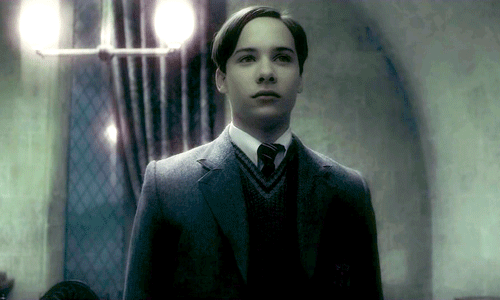
Take this shot, for example: he does that head-tilt thing that Coulson does, and it’s actually... kind of... cute???
Imagine Dillane filmed from slightly above, like Coulson usually is, and it looks even more innocent. (I mean, come on, he does not look like he’s killed four people, does he?) It’s not hard to imagine teachers being taken in by this kind of act.
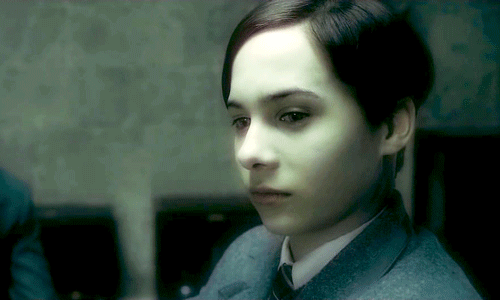
Even that little smirk he does when the camera (aka, Harry’s gaze) pans in, is for Harry’s benefit. No one else noticed that.
However, I still fail to find this creepy, like, at all. Yes, it’s a fake smile, but he’s portraying a different side of Tom Riddle to Coulson. Whereas, in COS, he’s in his vindictive, murderous element, where he’s free to express himself, in this scene, Tom Riddle is doing what he does best -- manipulating and managing appearances.
This entire scene is an act. And because Harry knows it’s an act, it should look a bit stilted.
From the Hepzibah Smith scene in the books: Voldemort smiled mechanically and Hepzibah simpered.
So, Harry is pretty adept at parsing Tom’s fake expressions.
But just look at the expressiveness in his face: he goes from brooding, he blinks, and his entire face changes to this charming (fake) smile.
At the risk of sounding elitist, I’m a bit tired of seeing the word ‘psychopath’, which is not an actual medical diagnosis recognised by any psychological or psychiatric institution, being tossed about, especially with reference to Tom Riddle (and from a neuroscience perspective, it’s doubly annoying). There’s no such thing as ‘insanity’ or ‘psychopathy’ or being ‘crazy.’
-although I use it too a shorthand in conversation to distinguish ‘canon’ Tom from his ‘softer’ OOC counterparts, I really shouldn’t-
Unfortunately, I’ve seen the ‘psychopath’ comment used time-and-time again as an excuse or a full explanation of ‘why Tom Riddle went evil’ (JKR in fact, has made a weird comment in an interview, basically saying that ‘psychopaths can’t be redeemed or learn adaptive coping skills’ or whatever), which really just goes to show the lack of understanding and compassion when personality disorders, especially, are concerned.
But what I like most about the opening of this scene, actually, is that first, listless expression. And this is where we get slightly into headcanon, but Tom Riddle is the opposite of a happy, mentally healthy teenager. By Dumbledore’s own admission, he has no real friends. He has no parental figures, no real attachments. Yes, he might derive some pride or enjoyment from being good at magic and top of his class and all that, but I really don’t think even Tom finds that truly fulfilling. There is nothing that makes him happy.
In fact, although some might perceive it as ‘creepy’, I think that listless expression is an accurate window into Tom’s psyche.
I know people aren’t big on Freud, but I think that he does make some interesting points (also, cut the guy some slack for being relatively open-minded for the Victorian Era, and inventing psychoanalysis and while yes he did say some sexist stuff, good luck finding a field of science that isn’t male-focused and makes crazy generalizations about women, especially back in the day) about the possible origins of thanatophobia, the fear of death.
According to Freud, thanatophobia is a disguise for a deeper source of concern -- he did not believe that people were capable of conceptualizing their own death to that extent. Instead, he believed that this phobia was caused by unresolved childhood conflicts that the sufferer cannot come to terms with or express emotion towards.
Now, I know Freud almost always attributes mental distress to childhood experiences, but I think in this case, it really has some merit.
According to attachment theory, the basis of how we form attachments in adulthood is dictated by learning it from experiences with caregivers in the first two years of life. We know Tom was born in an orphanage, and that he didn’t cry much as a baby, and subsequently, probably received very little attention. Compounded with possible genetic factors and his caregivers being afraid or wary of his magical abilities, he later struggled to form attachments because of this -- I would actually go so far as to say that by the time Dumbledore meets him, Tom Riddle is severely depressed.
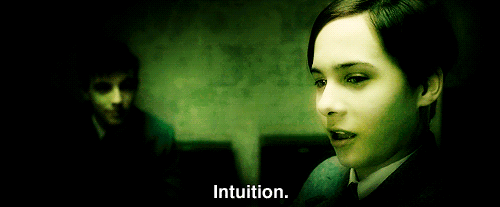
And that flat affect and anhedonia, I think, comes over very well in Dillane’s portrayal. There’s kind of this resignation -- a very deep sadness and loneliness to his character.
Of course, he doesn’t derive any comfort or fulfillment from human interaction, because (to borrow the description from the Wikipedia article on ‘Reactive attachment disorder’, which Tom meets all the criteria for) he has a “grossly disturbed internal working model of relationships.” In other words, he is unresponsive to all offers of attachment because of this unacknowledged trauma.
(You could arguably class Tom as having an avoidant attachment style, but I think in his case the trauma and its effect on him are severe enough to call it disordered.)
RAD isn’t particularly well-characterized (especially neurologically) and quite new in the literature, but here are some links if anyone is interested in doing a bit of digging: Link 1 | Link 2 | Paper 1 | Paper 2
And, instead of trying to resolve this conflict in a healthy way, or at least recognize that this is why he can’t be happy and try to learn how to cope from there, he (a) represses the desire for human attachment and (b) funnels that negative emotion into being the fault of Death, the Grim Reaper (again, to borrow Freudian terms).
And we all know how that turned out...
(And now, this should go without saying, but psychoanalyzing fictional characters has nothing to do with assigning a morality to mental disorders. Mental illness is neither a cause nor an excuse for criminal behavior -- in the same way that the cycle of violence is a phenomenon, not an excuse. Tom Riddle did not become a genocidal murderer because, in common parlance, he was a ‘psychopath’ -- he was not necessarily ‘predisposed’ to evil and could just as easily chosen to not follow the path that he did -- instead, he willingly made poor choices. This is a descriptive analysis, not a justification -- a ‘how’, not a ‘why’)
Here’s a Carl Jung quote that articulates it better:
“I am not what happened to me, I am what I choose to become.”
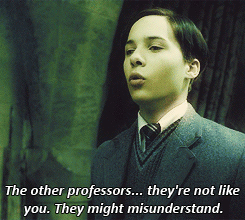
Yes, he’s a bit stiff (and a lot more formal than in COS during his *conversation* with Harry). But, and here comes the controversial bit, this is appropriate for a portrayal of a schoolboy in the 1940s. The upright posture is accurate -- respectful, polite -- everything Tom Riddle would have been expected to be (and even Coulson, in that scene with Dumbledore in COS, is quite stiff). Even the way he looks at Slughorn and maintains eye contact is very *respectful.*
And, Dillane (I think he’s seventeen or eighteen here) actually looks like a believable sixteen-year-old. I’m sorry, I love Coulson’s portrayal as well, but he looks around nineteen in COS; so in HBP, he probably would have looked at least twenty-two or so. (Sorry, not sorry).
This may be influenced by my own interpretation of the character (because I imagine Tom always looks young for his age, and Dillane fits that archetype, but I don’t think that’s very popular), but I think young Tom Riddle is supposed to be *cute* and a bit stiff/shy/awkward (being charming and awkward is very much possible), if you consider the way Dippet and Slughorn treat him.
To support this, he says very few words to Hepzibah Smith (in the book, that scene’s not in the movie), and is very... bashful and coy during the whole interaction? I think yes, he’s charismatic, but he’s not loud, suave, openly flirtatious or particularly verbose. Tom Riddle should have a quiet magnetism, and to me, that came across in Dillane’s portrayal.
"I'd be glad to see anything Miss Hepzibah shows me," said Voldemort quietly, and Hepzibah gave another girlish giggle.
...
"Are you all right, dear?"
"Oh yes," said Voldemort quietly. "Yes, I'm very well. ..."
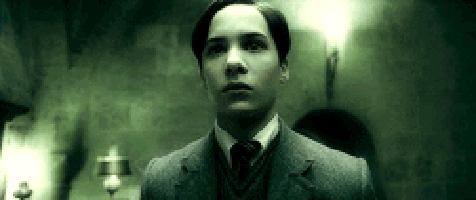
Even the ‘ugly, greedy look’ described in the books, when Slughorn starts spilling his secrets, is there. This is how he’s supposed to look! Slughorn glimpses it, but doesn’t understand its significance. Harry does.
“Slughorn looked deeply troubled now: He was gazing at Riddle as though he had never seen him plainly before, and Harry could tell that he was regretting entering into the conversation at all.”
Remember the context of this moment, as well: He’s just discovered how to create multiple Horcruxes. Excuse him for looking a bit creepy (if not now, then when?).
Here’s two direct quotes of Harry’s impression of Tom Riddle in that scene:
“But Riddle's hunger was now apparent; his expression was greedy, he could no longer hide his longing.”
“Harry had glimpsed his face, which was full of that same wild happiness it had worn when he had first found out that he was a wizard, the sort of happiness that did not enhance his handsome features, but made them, somehow, less
human. . . .”
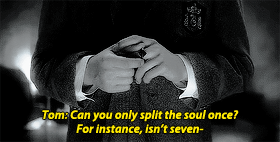
Tom Riddle’s Horcruxes are a direct metaphor for his refusal to allow himself to heal from his trauma -- instead, he continues to inflict destruction on himself and others.
His desire to continue creating more Horcruxes sort of resounds with the fact that self-harm can also become a compulsion.
I’d also like to digress a bit to discuss the Gaunt Ring, while we’re at it. While we’ve talked about his attachment issues in general, this discussion is particularly pertinent to father figures. And while Tom’s attachment issues are extensive, I think there’s ample evidence that as a child, he craved acknowledgement and acceptance from a father figure -- the man who gave him the only thing Tom truly owned -- his name. He would have had a vaguely defined mother figure in Mrs. Cole, perhaps.
"You see that house upon the hillside, Potter? My father lived there. My mother, a witch who lived here in this village, fell in love with him. But he abandoned her when she told him what she was.... He didn’t like magic, my father ... He left her and returned to his Muggle parents before I was even born, Potter, and she died giving birth to me, leaving me to be raised in a Muggle orphanage ... but I vowed to find him ... I revenged myself upon him, that fool who gave me his name ... Tom Riddle. ..."
We know that by June of 1943 (COS flashback) Tom has already uncovered the truth of his parentage; he knows he is the Heir of Slytherin via the Gaunt line, and he describes himself to Dippet as ‘Half-blood, sir. Witch mother, Muggle father.’
In Part 1, I discussed the high probability that as a presumed ‘Mudblood’, Tom Riddle was treated rather poorly in Slytherin House. But by this scene in the fall of 1943, he is surrounded by a group of adoring hangers-on. Why?
In my opinion; the Gaunt Ring. We know that Tom stopped wearing it after school, so its sentimental value couldn’t have been that great. We know he likes to collect objects (which I believe stems from his attachment issues -- he seeks comfort in things instead of other people).
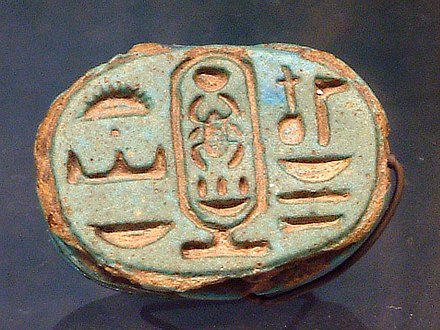
Signet rings (such as the one belonging to Tutankhamun seen above) were used to stamp legal documents and such, in order to certify someone’s identify -- like an e-certificate, if you will. Like Tutankhamun’s ring, the Gaunt Ring bears an identifying symbol -- Marvolo Gaunt tells us proudly that it bears the Peverell family crest.
By the Middle Ages, anyone of influence, including the nobility, wore a signet ring. Rings in antiquity were auspicious -- they signified power, legitimacy, and authority. And so, I believe that all the Sacred Twenty-Eight families would have worn these, too.
And so, bearing the Gaunt Ring would have established Tom Riddle, symbolically and in the eyes of the Sacred Twenty-Eight (his future supporters and followers), as the legitimate heir to the House of Gaunt. This is why, I believe, Tom coveted the ring as soon as he saw it -- not just because it was a family heirloom, and not just because he thought it was a pretty toy for his collection.

(He curses it so that no one else but him can wear the Gaunt Ring safely.)
This is why, to make the legitimization literal as well as symbolic, Tom murders his father and grandparents. It’s not just an act of vindictive, murderous rage due to his perception of being rejected by his father (although it is that, too). And so, Tom, abandoning his search for a father figure (and possibly also giving up on the possibility to allow himself to heal from his own personal trauma rather than continue to inflict it on others), ‘cleanses’ his bloodline, to make himself truly legitimate. It’s rather telling that instead of affirming his legitimacy as a Riddle, which would have put him in line for a nice inheritance, and hey -- money is money -- (thus accepting his half-blood status), he simply kills them all. He has done all the murdering he needs to become immortal (and he hasn’t had the discussion about multiple Horcruxes yet); but yet, he does it again. Frightening stuff.
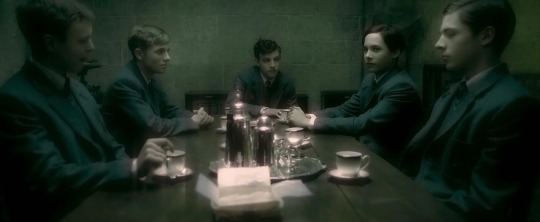
(Just look how the others look at Tom. All but the one to his left -- possibly Nott, Rosier, or Mulciber -- have their torsos turned towards him. Their attention is on him, while he knowingly regards the viewer/Harry. Tom seems a little uncomfortable with the attention.).
“And there were the half-dozen teenage boys sitting around Slughorn with Tom Riddle in the midst of them, Marvolo's gold-and-black ring gleaming on his finger.”
...
“Riddle smiled; the other boys laughed and cast him admiring looks.”
...
“Tom Riddle merely smiled as the others laughed again. Harry noticed that he was by no means the eldest of the group of boys, but that they all seemed to look to him as their leader.”
The ‘gang’ are true hangers-on; Tom doesn’t seem to pay them much attention.
So, if not via careful flattery or charisma, the attraction must be status.
And perhaps yet more telling...
"I don't know that politics would suit me, sir," he said when the laughter had died away. "I don't have the right kind of background, for one thing."
“A couple of the boys around him smirked at each other. Harry was sure they were enjoying a private joke, undoubtedly about what they knew, or suspected, regarding their gang leader's famous ancestor.”
That, in my opinion, is as good as we’re going to get as proof that Tom’s shiny new signet ring (and by extension, his new status) made a big impression on his fellow students.
So, when he returns to Hogwarts, he is ‘pureblood’. He is cleansed of his Muggle roots, and becomes the legitimate heir of the House of Gaunt, now well on his way to becoming Lord Voldemort...
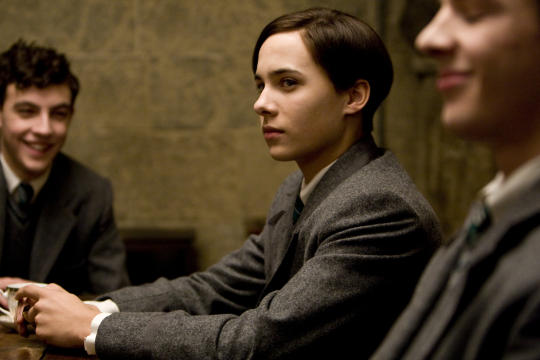
Watch the scene again, with a critical eye, and imagine Slughorn’s perspective, instead of Harry’s. There’s nothing creepy about Tom Riddle... unless you know what he is...
Strip away all the effects of Harry’s gaze (and notice, here he’s still looking at Harry), and he’s quite the charmer, actually.
(I will concede that I don’t like the promotional images where they have him looking like he’s up to no good. And I do wish he blinked once in a while.)
My challenge to you: Rewatch the scene with an open mind, and let me know if you agree that Dillane’s portrayal comes off as depressive rather than ‘creepy.’ And if not, why do you dislike his portrayal?
#tom riddle#character analysis#character study#the many faces of#tom marvolo riddle#frank dillane#i literally could not find any pictures other than these#literal crumbs i swear#i know this is unpopular#people really dislike him i guess#watch the scene again with an open mind i promise you'll like it#i seriously do think he did a good job#tw: mention of child abuse#tw: mention of self-harm#i'm not trying to oversimplify things but you can't deny that maybe if tom was hugged as a child it would have helped#say it with me: psychopathy is not an actual medical diagnosis#it's actual more of a legal/criminal justice term#and people just use it as a synonym for 'evil' at this point so the original meaning is pretty much obscured#and personality disorders should not be moralized#people with personality disorders are not 'evil'
90 notes
·
View notes
Text
Sherlock rant
I recently rewatched BBC Sherlock for Rupert Graves, and aside from the lack of Lestrade appreciation I have a lot of problems with this series. Here are my thoughts:
1. It was all a blur
My second first impression of the show: I don't remember anything but the characters. And some characters I just blatantly forgot, like Mary. And I loved Mary on my second watch! I really forgot that at one point John actually got married and I don't even remember when I watched the show for the first time. I can still recall most of HIMYM's events and I hated that series.
2. It’s overall not a detective/crime show
Watching Sherlock for the second time, I mostly turned off my brain and just let it play in the background because (1) there's hardly anything for me to solve with the characters, most clues are taken by Sherlock off-screen anyway (especially after season 2), (2) they focus way too much on the quirks of the characters that make it almost like a sitcom that got dragged on for way too long. A crime/detective show shouldn't allow me to turn off my brain.
3. The characters just kinda fall flat
Exploring the depth of human emotions is not a bad approach to a modernized version of anything, I’m not trying to pretend I’m better than someone who gets sentimental over fictional character (if you know my blog at all, you know I am not), but at least write good characters. Sherlock is hardly a multi-faceted person; in fact, he’s kinda like the Wattpad teen fic main character sometimes. He physically fights off some terrorists with a machete to save the damsel in distress? He gets high off his tits but still got everything right all the time? John is just kinda there for most of the cases. Jim is a poorly written antagonist. Irene is a lesbian but gets the hot for our main character, surprise surprise. The only interesting characters to me are the ones who act like normal people: Molly, Greg and Mary. They are the multi-faceted characters, ones who I can actually relate to without feeling inferior to them in any way. Write characters like them, stop trying to be smart about it and stop writing Wattpad fanfictions for Sir Conan Doyle’s original works.
I get that they try to make Sherlock more like a human with emotions, making him quirky and arrogant, then make him quirky and more likable. It’s hardly a convincing character development though. He’s given over-powered deduction skills, so edgy, so high and mighty all the time. When he is finally written as vulnerable, turns out he has plans for that too. I would love to see him get it wrong once and maybe get humbled by that mistake, but getting Mary shot and killed is hardly even his fault, he is only doing his job. And killing off Mary is overall a bad idea anyway.
4. They treated the fandom like shit
I was absolutely disgusted at the start of season 3 when the showrunners just straight up shat on their fans. I wasn't there with the fandom during the wait between season 2 and 3, but I believe it was a pretty long wait (2 years, I could barely wait 2 years for my comfort series, and they have like 10 episodes per season), and they were presented with the first actual mystery of the series: How did Sherlock survive the fall? After years of waiting and having fun theorizing, they were met with a mockumentary about them, starring the most hated character of the protagonist and the fans. Those are the people who actually cared about the show for god's sake. The fact that the showrunners treated fans like crap and there's still an active fandom for the show appalled me.
Now not only The Empty Hearse bugs me, but the entire show does as well.
Allow me to digress.
Doki Doki Literature Club is a great example of audience engagement done right (Sorry for using this example I’m not actually that invested in the other franchises). After the success of the first game, the story provoked so many fans into solving the mysteries of the characters, some of them went really, really far. And that’s because of the actual mysteries that the development team took effort to plant into the plot. There is actual pay-off for painstakingly following the clues; as far as I know, only two (2!) people in the world have come close to solving the mystery of the first game (or they actually did). The game developers value their fans and their intelligence enough to have planted those clues where they did, and it’s a genuine exchange between the fans and the creators. Now even though you haven’t actually played the game, when you hear of the name and you’re only kinda familiar with gaming (like me), you’ll probably know what it is. What started as a mere open-source game by an indie developer became a sensation which left millions of fans begging for more.
Looking back at Sherlock, there are tons of logical flaws for a self-proclaimed crime series, virtually no clues for the audience to solve crimes along with their favorite detective, and when there was actually a mystery (Sherlock jumped off the building), they plainly showed him alive and well minutes later. Do we really need to see things spelled on screen to know what’s going on? Are we supposed to accept that Sherlock Holmes is an all-knowing future-predicting genius now too? Not a great sign of respecting the audience there.
So far, the only thing left that’s interesting about this series is the characters’ dynamic. Which brings me to the next criticism I have for the show.
5. The plague that infested mainstream media
Why is there still an active fandom? Queerbaiting and targeted marketing.
Community marketing is proven to be one of the best marketing methods there is, if not the best, to lengthen the lifespan of a product or service. The way they do that for shows and films and video games is usually by planting seeds of possible lores and history inside the content. Look at Harry Potter or Lord of the Rings, they are franchises that ran for multiple years with a ton of history and world building that provokes fans’ imagination.
Sherlock - well, Sherlock has sexually ambiguous men.
Sherlock has a formula for success. It was an adaptation of the most iconic detective novel in the world, funded by one of the biggest TV networks in the UK and possibly the world (don’t quote me on this). Making this series means you can appeal to such a wide group of audience even before airing. Adding in the quirky smart men who live together, you’ve basically guaranteed a prime-time show with millions of loyal fans all over the world.
Fans are not stupid, and queer people don't just find queerness everywhere they go. They know a gay subtext when they see one. Sherlock came back from the literal death for John, pretty gay if you ask me.
This show is very much not just about some guys being dudes solving crimes, they have relationship that’s deeper than friendship, and definitely not platonic. They deliberately wrote a sexually ambiguous Sherlock Holmes from the get-go - literally from the very first episode, then capitalized off of the targeted demographic, never a pay-off for their anticipation. Martin Freeman said in interviews that he could recognize Sherlock fans, them being generally women from 16 - 25. No shit Sherlock, this show targets them and capitalizes off of them, being quirky and gay as hell, of course the fanbase is generally 16 - 25 and female.
Sherlock queerbaited the fandom for years for the sake of marketing and there’s never a pay-off, nor was there any recognition to the community, and to add to all that bigotry, queercoding pretty much all of the villains? Why was a show aired in the 2010′s allowed to do this? Why did Mark Gatiss, an openly gay man, a writer of the show, allow this to happen? Why are millions of fans all over the world allowing all this to go on?!
6. Conclusion
Now I haven’t read the books yet, so I’m not at all qualified to criticize the adaptation quality of the TV series; I’m just talking about the TV series on its own. Despite my criticism, I think the first two seasons did quite okay. There are quite a few nice cases there, I like The Blind Banker and The Hound of Baskerville. They did those well because the focus was on the cases themselves, and the connection between John and Sherlock was only in the background. I, like many other fans, like to figure things out on my own, to read between the lines, and to not have things spelled out for me. With the next seasons bombarded with Sherlock and John bonding it seriously felt like mere fan service for me and even though I wasn’t there when the show was on, I still felt like I was robbed and my interest in the show was abused.
Sherlock is undoubtedly super influential in pop culture even now. It has to have done something right to be in that spot (capitalizing off loyal fans?). I’m not writing this rant to change someone’s mind about the series, by all means, I’m still gonna love the hell out of Gavin Lestrade, and absolutely lose my mind over Mary Watson. So do take my words with a grain of salt, I’m just disappointed that one of the most influential shows there is is just short of my expectations.
10 notes
·
View notes
Text
Lumine and The Goblet of Fire
Word count: roughly 2.7k for this part
disclaimer: first of all, this au was heavily inspired by @majunju 's incredible art! she made chilumi as beauxbatons and durmstrang students and my brain went brrr so i had to write something for them??
both Genshin Impact and Harry Potter are not created by me. However, i took the liberty to mix a lot of concepts in this AU, so have that in mind when reading.
for sake of plot, lets pretend that Durmstrang is located in Russia. Lumine, Paimon and Aether are the only ones from Beauxbatons, while the rest are from Hogwarts unless mentioned otherwise. All the characters that have adult models, like Jean, Lisa, Kaeya and Diluc are presumed to be adults, with Childe being the only exception. Also, all the characters that use children or teens’ models are students, with a few exceptions like Venti and Scaramouche [mihoyo pls stop giving us confusing ages and body models i never asked you anything]
(please, have in mind that english is like, my third language, if you notice a spelling or grammar error, feel free to message me!)

Act One: Lumine and her stupid impulse control
“I’m going to put my name on it.” Aether broke the silence suddenly
“What...? No! Oh god, I expected that from Paimon, but you’re just as bad as her!”
There were a lot of things that Lumine hated.
Open shoes. A very specific type of silk-flower based perfume(Aether once tried it because he wanted to impress a girl, but it ended stinking for two weeks straight). History of Magic. Condensed slime— those that Paimon loved, but she couldn’t even see it without being sick—, potions that took more than one single day to brew. But the worst, certainly was—
“C’mon, Lumine! You’re just afraid that you’re going to get your ass kicked in the tournament!”
...when Aether was being dumb.
“No, I’m not!” She countered quickly, ignoring the way Aether smirked like he knew exactly what buttons to push. Actually, it wasn't that far from reality, if she was being honest. She eyed the paper carelessly torn from his notebook that had his name as if she could burn it only with the power her heavy gaze. “You’re being dumb! Are you deaf or something? DIdn’t you hear them saying that the Triwizard Tournament has a high death count?”
“Paimon is sure it isn’t that bad!” The half-fairy smiled at her, eyes twinkling in greed and mischief. Lumine narrowed her eyes at the way she happily jumped in her steps, staying afloat in air for more time than it was normal to common humans “After all, they're opening it again, right? I’m certain that the ministry has done something to make it safer!”
“You’re the one to talk! You don’t care about anything other than the mora!” Lumine was quick to shut her down, sending a glare that didn’t affect any of the two. In that moment, the three of them entered the hall which had the Goblet of Fire in its full glory, a bunch of Hogwarts students surrounding it like curious birds, eager to know which students were applying for the tournament.
“Have a bit of faith, wont’ya?” Aether smiled boyishly, flicking his wand from his sleeve and hitting it slightly at the top of his head, also giving a wave to a bunch of ravenclaw girls that awed at his presence. He continued in his confident stride, each step leaving him closer to the Goblet “Arent I the best of our school when it comes to Charms? Besides, I have my beautiful, great and awesome sister which of course, will give her full support and use her full knowledge to—”
“Shut up, you know it's not that what I’m concerned with!” Lumine hissed, grabbing her brother’s wrist and tugging, lowering her voice. In the corner of her eye, she saw the Dumstrang guys eyeing her, Aether and Paimon like wolves, ready to pounce on them. “You heard the rumors, right? Please, don’t tell my you’re that reckless-”
“What rumors?” Paimon squeaked, her eyes going wide for a fraction.
“The Fatui. You know them, right? The Tsaritsa’s pawns.” She whispered, narrowing her golden eyes and not daring to let her guard down when she was in the same room as the Durmstrang and Hogwarts students. “There are rumours that they are at the move. Some say that her personal minions, The Harbingers, are also involved in some dark scheme around Hogwarts.”
“Nah. You’re just being paranoid, there’s no way someone of that caliber would be here" Aether raised his eyebrow and Lumine wanted to tug her hair out in pure frustration. “Besides, it’s not like I'm some helpless dead weight. I know I already said it before, but I’m really confident it’s going to be fine.”
“Aether is right, Paimon thinks you should relax!” The white-haired girl smiled brightly, nodding her head to herself. “Or even better, you could enter the tournament too! It would make our chances of representing Beauxbatons even higher!”
“Don’t you ever listen to me? Why would I—” Before she could complete her nagging, Aether quickly threw his paper into the Goblet, the flames flickering aggressively before consuming his entry. Her mouth fell open in disbelief, but the crowd around them didn’t seem to notice her reaction as they gave a round of applause for her twin.
“What, Lumi? Are you afraid of losing?” He made a point of taunting her with the most infuriating shit-eating grin he had “Or… Maybe you’re not up to the challenge…? Y’know, it’s really okay if you feel too scared to face some bad guys—”
Ah. Right.
Aether knew how much she loathed being underestimated.
“Shut up!”
"Aww, there is no need to be this angry! I'm your big brother, of course I'll know when you feel too scared to put your name on the Goblet! It's okay to feel insecure, and I think it is better for you to not enter as you might not be able to—"
The crowd cheered again as the Goblet of Fire consumed another entry from Beauxbatons Academy.

“Lumi—”
“Shut up, im still mad at you.”
Aether smiled sheepishly under his sister’s heavy glare and Paimon giggled. Lumine also sent her a heated look, making the half-fairy squeal childishly.
“Luuuuumi!” Aether whined, making her sigh. “Don’t be mad at me! You were the one who put your name on the Goblet, right?”
“Don’t act like you’re innocent! You know damn well what you did—” She hissed like a annoyed cat. Aether pouted and tried to trap his sister into a hug, but she slapped him away on pure instinct.
“Chill, chill! At least we’re getting a feast tonight, right? Not like we don’t eat well in any of the other nights, but a guy told me that Hogwarts’s food is really amazing on these special days!” Aether pleaded, the bright grin revealing how amused he was with his sister’s grumpiness.
“Free food is great, but free great food is even better! There is absolutely no way you can be mad after you eat, right?” Paimon tried, and Lumine let out an even more tired sigh. “Besides, a lot of students applied for Beauxbatons! What are the chances of you being chosen, especially since you don’t actually want to do it?”
“Shut up Paimon, you just jinxed it,” Lumine scolded half heartedly, tucking her notebook under her arm.
The bunch of Hogwarts students were a handful. Even with the merged classes to accomodate the Beauxbatons and Durmstrand delegations, it seemed like the hosting school’s own students were never going to be used to see them in the classrooms and corridors of the castle. Everywhere they went, their blue uniforms made the crowds stare them down with admiration, suspicion, curiosity or even anger in some cases.
Aether and her were somehow getting even more stares than the other Beauxbatons students. Her twin shined under the spotlight, offering a gentle smile to the brave girls who tried to talk to him sometimes —how strange it was to see her brother gathering a bunch of fangirls—, but she felt uncomfortable under the attention.
“You’re too tense, Lumi” Her brother chimed, as if he could read her thoughts. His arms were carelessly fold behind his head and he shot her a gentle smile. “No one is going to bite your head off if you smile a bit, right? Just relax!”

“Now, the moment you all have been waiting for...! The Champion Selection!” The Headmaster, Barbatos announced, his voice carrying in the big hall and being able to shush all chatter. With a swoosh of his hands, the lights on the walls dimmed down, leaving the Goblet of Fire as the main attraction.
Lumine felt a shudder in her spine, knowing that despite seeming like a simple gesture, the skill level required to perform a wandless and also wordless spell was higher than everything could even imagine herself doing. Deep inside her gut, the respect she had for the Hogwarts Headmaster was raised to the roof, especially since his appearance was nothing but of a kind and carefree young boy.
Below the table, her hands were connected in a silent prayer. Her luck couldn’t be that bad, could it?
If everything went well, neither her or Aether would be chosen.
“Mr. Alberich, would you like to do the honors?” Barbatos asked a blue-haired man, who Lumine vaguely recalled being a member of the Ministry of Magic named Kaeya. As he nodded and approached the Goblet, she felt her shoulders getting even more tenser.
The flames flickered aggressively, but Kaeya didn’t seem to be intimidated by it. He slowly extended his hand, the fire spiking suddenly and changeling from blue to a menacing pink as it spat a piece of paper.
“From Hogwarts School of Witchcraft and Wizardry, Albedo!”
The crowd— majority being from Hogwarts itself, the hosting school— cheered loudly, the most excited ones being from Ravenclaw. A boy dressed in blue rose from his seat, his ash-blonde hair styled in a braid at the back of his head and teal eyes immediately catching Lumine’s attention. He quickly went to the front and was guided by one of the teachers to a backroom, disappearing from everyone’s view. Mr. Alberich waited until the cheers died down to announce the next Champion, the flames shaking as if the own Goblet was impatient. Finally, with a burst of green, another paper flew into his hands
“From Durmstrang Institute, Childe!”
This time was the turn of the students seated at the end of Slytherin’s table to scream, a lot of figures rising at once and making it almost impossible to pinpoint who exactly was Childe. However, Lumine could see how a tall guy with a slim build was receiving some strong pats on his back, his messy ginger hair being attacked by another short guy who was too enthusiastic. His eyes still glinted with pride and excitement, even if the neatness of his red uniform was entirely ruined by his peers.
She clapped politely, lowkey still distressed about the next Champion. She was suddenly startled when the guy, who was definitely Childe as he finally went to the front, made unexpected eye contact with her. His eyes lingered a few seconds more than she would be comfortable to admit, making her even more anxious.
Mr. Alberich approached the Goblet again for the third name. For some reason, Lumine thought that the man was being slow on purpose, or that the Goblet was being too indecisive, as the flames flickered between blue, yellow and orange aggressively for a few seconds. Everyone else seemed to notice this too, a few curious whispers breaking out between the students. Kaeya narrowed his eyes and then, not a second too late, the Goblet spat the last entry.
“From Beauxbatons Academy…”
Her stomach dropped and she thought she would throw up on the spot.
“...Lumine!”
Aether screamed the loudest, right beside her ears. Paimon came to a close second though, shaking her by her shoulders like a ragdoll as if there wasn't a tomorrow.
"Lumi! Lumi! What are you waitin' for? Go to the front!" She got up, feeling her stomach do all the kinds of flips and lowkey dizzy. Her head couldn't even register properly the cheers, her mind too busy shouting all the bad words she knew at her mental images of Paimon and her brother.

She took in a deep inhale, keeping her breath until she was in the front of the whole hall, right in front of the teachers. Lumine saw the Beauxbatons Headmaster’s eyes take her in with slight tension in his slender fingers and she couldn’t help but to feel out of place.
"Mr. Zhongli…" She greeted quietly at the man, his tiny nod being the only thing to indicate his acknowledgment. He quickly led her into the backroom she saw both Champions go before, his brown cape flying elegantly behind him with every step.
"Miss Lumine, what a pleasant surprise… I must admit I didn't expect you to put your name in the Goblet." Zhongli started as a matter of fact, even if his eyebrow had a curious arch, as if expecting her to explain this turn of events.
“Yeah, neither did I, if I’m being honest.” She sighed, her hand wrapping around her stomach to hopefully help with the nausea and anxiousness
“Be assured, I’m sure the Goblet of Fire made an excellent choice for our school.” Zhongli said, his voice acquiring a softer tone, probably noticing how the blonde fidgeted a lot. Lumine clenched her fists, taking a deep breath. The man didn’t say anything else, and both of them reached a room decorated with Hogwarts’ trophies from the many tournaments held before.
She immediately saw Childe in a corner, poking a shiny statue that seemed to react at his mean touches, his eyes shining with some kind of rush and impatience she really didn’t want to explore any further. A tall woman, with elegant white hair that reached at her waist and ice blue eyes, slapped his hand harshly, freeing the poor statue from the Dumstrang’s clutches. Lumine didn’t know who exactly this woman was— It was common knowledge that Durmstrang Institute’s headmaster couldn’t be bored to attend the tournament personally—, but she could assume safely that she was at least a teacher.
With his distraction taken forcefully from him, Childe finally seemed to notice Lumine, turning on his heels with hands on his pockets. The witch felt another chill, incredibly uncomfortable with his heavy gaze analysing every feature, but she prayed to every god that she could at least maintain the stoic features she was quite infamous for. His blue eyes stopped carefully to analyze her face— a fact that she pretended to not notice by looking away—, with a satisfied(?) smirk appearing on his face that screamed bad intentions.
It took more than she would like to admit to pretend she wasn't the least affected by his heavy gaze on the side of her face. Her arms crossed around her face, her hand resting discreetly above the hidden pocket in her blazer that had her wand. Golden eyes searched the room again for another distraction, until they landed on the figure of the ash blonde boy chosen for Hogwarts.
He was pretty, no one could deny that, but even if he had those stupid charming eyes of his, there still was something about him that really threw her off. She couldn't exactly pinpoint it, but Lumine was sure that Albedo had some kind of deep dark secret kept hidden in himself. Was the whole Harbinger thing making her paranoid?
Before she could answer her own question, Barbatos entered the room with other Hogwarts teached in tow. The three of them— her, Childe and Albedo— came closer to the fireplace where everyone gathered, eyeing the teachers and the Headmaster who stood in front of them in a neutral position, except for mr. Zhongli, who was behind her, and the mysterious woman she supposed was Childe's teacher behind him. Occupying the vacant space, a pretty woman immediately went to stand at Albedo's back. She had light-brown hair and alluring green eyes, but the most iconic feature was her curvy body accentuated by her purple dress.
If she had to guess, she would assume that she was Ravenclaw's house head. Technically, Barbatos had to be a neutral party, as the hosting Headmaster, even if everyone knew his favouritism towards his own school.
"Well, now that we're back here, far from prying eyes, guess I can finally drop the formalities!" The small man suddenly said with a big smile, catching her off guard. In the corner of eye, she saw that Childe had a similar reaction, but Albedo seemed exasperated. "I must say, this year's competition is going to be tough. But I'm sure you three will be able to handle it just fine, hehe!"
Oh god. Was Barbatos like this in real life…? Suddenly, the previous mighty and ruthless image she had of the Headmaster was shattered. All the books talked about him as one of the seven great wizards of the last war, so she expected something more… Aggressive?
"Venti, please." For a greater surprise, Mr. Zhongli seemed used to his attitude, poorly hiding his smile behind a fist.
"Yeah, right. The Triwizard Tournament" He forced a cough, hardening his expression and straightening his posture. "From now on, Mister Childe, Mister Albedo and Miss Lumine will face difficult trials to determine which one of you is the greater wizard. I should also mention that the prize will be eternal glory and ten million mora, of course."
"We already warned you before, but let me repeat it. If you don't take these challenges seriously, you'll probably be squashed to the ground." Mr. Alberich stated bluntly.
"Is there a chance of dying?" Childe asked, the way his head tilted indicating that he wasn't asking just because he was scared.
"There were a few casualties some years before, but this time, the Ministry is making sure to bring some precautionary methods." He answered cooly, his expression not changing the slightest. "That being said, we still stand on the recommendation that you take extreme caution."
He didn't deny it. The fact didn't pass above any of the students' minds, Lumine tensing her shoulders, Childe grinning madly and Albedo pressing his lips.
"Anyway, about the first task," Barbatos took the lead again, a satisfied smirk on his lips. "The three of you will face an ability challenge. In other words, you'll be facing magic combat right from the start."
"Against each other?" Lumine asked, not wanting to fight Childe even in her dreams. He exhaled some mad, maybe sociopath vibes if she looked at it from a certain angle, and she certainly didn't want to test her theory.
"Nope," Barbatos said easily, tilting his head in fake innocence "Where's the fun in that? I can't say anything else, since it's supposed to be a secret until the trial— Ah, by the way, about the test, it will be on November 24th. You have two weeks to prepare, so have fun!"
Forget every good thing she had thought of him before. He was a Madman. She was surrounded by a bunch of madmans.
Oh dear lord.
#genshin impact#genshin#genshin lumine#paimon#aether#genshin childe#Chilumi#fiction#wow look at me again#brain go brrrr#getting into another fandom be like#brainstorming for 30 hours#and then regretting all life choices#aether is dumb but we love him anyway#paimon is a half fairy sorry i dont make the rules
63 notes
·
View notes
Text
Thanks a lot for answering! I wonder could you please give examples of everyday deeds/types of behavior of different primaries and secondaries? Like what are they like when there's a school test or when they need to visit a doctor? The more the better. Something more down-to-earth than the situations from the fantasy movies listed on the website that may never take place in the real world, something found in everyday life that will help someone identify themselves and mb others around them
I’m not sure I can do that, because frankly, your Primary House is a state of mind. It’s what you want and how you feel about things (or do not feel, in the case of Ravenclaws, ahem). But I can talk about a few things, particularly in response to Harry Potter, that can shed light on the state of mind of the Primary.
What I have most noticed about people in general is that we all have a built-in bias, and in order to find our true type—whether that is our MBTI type, our Enneagram core and tritype, or our Hogwarts House combination—we must abandon our ego defenses. What does that mean? We have to overcome our biases and want to know our true self, and own it, more than we want to fight against an answer that might not please us. In the Enneagram, I’ve noticed particular biases against being a 2 or a 6. Everyone wants to be the more “glamorous” 4 or the elusive, bookworm 5.
Harry Potter, for better or worse, introduced us to the concept of Hogwarts Houses, but also introduced us to a bias, because it made Gryffindor the most glamorous House, due to all the main characters (however unrealistically) hailing from that House. Or, at least, all the main characters we like. Ravenclaw is full of wise weirdos like Luna Lovegood, who irrationally believes in things no one can prove. Slytherin is host to mostly back-stabbing, snobbish cheaters. And Hufflepuff is an “afterthought” where all “the boring, nice people are.”
What I like about Sorting Hat Chats is… they made the entire system more interesting and a lot fairer. Now, Slytherin isn’t the only House with villains automatically placed in it: their villains have to be specific in their love (and not betray their family, because it is the house of My Family is My Life). This also means people, fictional or real, who prioritize their loved ones, are Slytherins. Such as Mr. Darcy, or Katniss Everdeen. Suddenly, being a Slytherin doesn’t seem so bad, right? Not if you are loyal to the ones you love! That alone will appeal to the mindset of a Slytherin, because they will think, “Of COURSE I am. Of COURSE my loved ones come first! They SHOULD!”
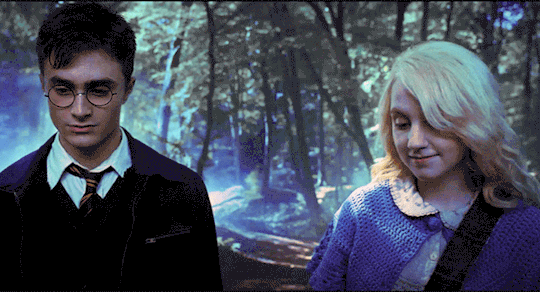
I have friends in all four Primary Houses, but I will use myself as an example of the Ravenclaw. When I was reading the books, having all the main characters in Gryffindor bothered me, because not only did it show a bias, but I felt some of the main characters ‘belonged’ in other Houses—such as Remus Lupin being a Hufflepuff rather than a Gryffindor. I also felt like Hermione belonged in Ravenclaw. But that is neither here nor there… my objections to the system came from the logical flaws in how she arranged it. It wasn’t realistic to have everyone ‘important’ or ‘admirable’ within the story come from Gryffindor. It was easier to have them share Common Rooms, but people don’t isolate like that and only befriend someone from their House. They look for like-minded friends who share interests, and would make them all over the place. It was my little Ravenclaw brain, pulling away at her system and finding flaws in its logic, but reacting from a place of logical reasoning rather than moral indignation.
When I took the SHC test, it placed me in Slytherin. And I was not opposed to that. In fact, I explored it for a long time, as I thought about how I respond in various situations. Slytherin appealed to me, because… I wish I could stand up for my family automatically. I wish I could prioritize my loved ones all the time. But I kept hitting upon the fact that – I like to think about things in a detached manner, and come to what I feel is a rational consensus. It’s more clinical and less emotional than Slytherins are—and it helped at the time that I knew a Slytherin, and could easily see both how possessive she was of people (they are “mine to protect” – she always reminded me of Slytherin Sam Gamgee in The Lord of the Rings, with his “MY MR. FRODO”) and how, without fail, her sister came before even me, her best friend. Through comparison, I knew I had to be something else. So in typical Ravenclaw fashion, I went through and considered them all. Because, as a Ravenclaw, I want to be RIGHT more than protect my ego. I am always looking for the truth, even when it hurts. And I am always measuring the world against an ideal in my head, built up of my belief system. I do not go against my beliefs; I mold myself to them. And it shocks me to find others who do not, but who claim to be the same as I am. I take, for example, my Christian faith seriously—so what do you mean you are ignoring what your faith says, and doing whatever you want??? YOU MOLD TO YOUR BELIEFS, DON’T YOU? Well, yes, if you are a Ravenclaw, you do. If you are any other House, you do not.
The Hufflepuff Primary I know has a far more ‘felt’ opinion of the books and their sorting system. She got livid reading them, and thinking about how constantly unfair it all was, how biased Rowling was, and how Dumbledore was clearly playing favorites constantly with Gryffindor House. She developed a bad attitude about him as a result… which, of course, is coming from her being a Hufflepuff. To a Hufflepuff, people come first. They are all treated fairly and seen as equals. You do not discriminate, you do not alienate, you do not give unfair favors to Harry and his friends, just so Gryffindor can win the House Cup over and over again. She was actually so angry about this, from a Hufflepuff perspective, that she was willing to be a Slytherin in defiance of ‘The System’ until she realized that kind of mindset is… pure Hufflepuff. “You are not being fair about this, I will oppose you.” It’s all instinctual, it’s all emotional, and it’s all loyalty to the human race, which includes Slytherins. (This caused us some friction for awhile, until I realized it was “just a Hufflepuff” objection, because... how can you be mad at Dumbledore for that? It’s just a convenient plot device in the book! ... says the Ravenclaw who isn’t getting too emotionally involved. ;)
The Slytherin I know, by the way, denied being a Slytherin at first, because she felt ashamed of it. She has been taught to act like a Hufflepuff, that she SHOULD care about everyone all the time, but… she does not. She cares about her loved ones the most, and she would protect them above other people, every time. I pointed out to her that Hufflepuff fits her less than Slytherin, because “You ARE Katniss. You told me that once. That you identified so heavily with her, because you would go into the arena for your Prim.” And then she admitted it, and saw the gloriousness that is being a loyal Slytherin.
The Gryffindor I know is always looking for a Cause, and… as a Ravenclaw, I find that exhausting. She wants to be mad about things, because that anger gives her the fire she needs to do something about it. She has taken on big Causes by financially supporting the Causes she cares about, and done physical things about smaller Causes. For example, as a teenager, she came upon three guys tormenting a dog. It made her so livid, she charged straight at them, swearing and screaming at them to leave the animal alone, and it scared them all so much, they turned tail and ran. She just knew it was the right thing to do, and she and I often butt heads a lot, because she expects everyone else (meaning me) to be as passionate as she is about doing the ‘right thing.’ My more detached “well, let’s look at both sides of this issue” has no place in her black and white Gryffindor mind (no, that is WRONG).

Secondary Houses are… something that may take a little more time to figure out, as you think about how you handle the ‘unexpected.’
Gryffindors… have to speak up if they see an injustice, or hear something they disagree with. They are they person who cannot keep their mouth shut, they need to voice their opinion. They don’t care if you don’t like it or don’t agree, to not state their views would be antagonistic to their central self. My Hufflepuff friend is a Gryffindor Secondary. Not only did she get mad about the biases in Harry Potter, she complained loudly about it, to me, and to other people, and even in a blog post, because the injustice of it needed drawn-attention to, and dealt with, and she doesn’t really care if you disagree. That’s just how she rolls, about EVERYTHING. Because Gryffindor Secondaries state their views. They see an injustice, and they rush toward it. (My Gryffindor friend is also a Gryffindor Secondary: see dog being abused, rush in to do something about it!)
Ravenclaws… want to prepare for everything, and then rely on their own skill set to handle problems as they arise. They are the person who, when their bike breaks down halfway home, consider what they know about bikes (can they fix this easily?), and what they know about public transportation (am I going to be able to catch a bus home?), and make decisions from there. Or who study for a test in advance and show up, only to panic because they found out they read the wrong chapter in the book and know nothing about it. My father is a Gryffindor with a Ravenclaw Secondary, and he over-prepares himself with any useful knowledge he thinks he might need to combat a wide variety of situations—and then is stumped if confronted by something he did not prepare for, and knows nothing about. He is always trying to think ahead and prepare so that he doesn’t have to improvise anything at the last second—because he sucks at it.
It was a comparison with him that actually shifted me away from assuming I had a Ravenclaw Secondary, because… I don’t suck at improvising. I’m actually quite good at it. And I don’t over-prepare, because in true Hufflepuff Secondary position, I figure I can ask someone for help. And they always give it to me. But what really cemented the deal for me, in terms of recognizing my Puff Secondary House, were two—no, make that three, truths from my life. 1) Ravenpuffs distill complex information and put it back out into the world for others to enjoy (hello, Funky!). 2) Puff Secondaries show up and do the tireless work, clock the hours, and are highly reliable, which is… me. I have run this site day in and day out for years. I am punctual, fastidious, I put my responsibilities ahead of all else (even turning down fun occasions because I need to work), and I will painstakingly work on perfecting something, finishing something, improving something, or polishing something (even when I’m bored). In short, I show up and do the work. And 3) the truth that Puff Secondaries have friends to stand up for them, because they have proven themselves reliable and trustworthy, is no joke. A few years ago, I had trouble with someone online and, without being asked, three of our mutual friends came to my defense. Proof of the Puff.
Lastly, Slytherin Secondaries are highly adaptable. It’s no problem for them to shift their approach given the needs of the situation. It’s the equivalent of a friend you admire, but who puzzles you (if you don’t share their Slytherin Secondary trait) because… it seems like they are a different person everywhere you go, because whatever is needed, they can become it. They are the person who has no trouble with change and no need to plan, because they just trust that it’s all going to work out fine, based on their ability to adapt. It’s the person who shows up at a friend’s birthday party expecting it to be formal, finds out it’s casual, sneaks into the bathroom to rearrange their attire, and emerges ready to play Twister. Or who will be serious with you, joke constantly with your brother, and behave like a saint around your mom, according to whatever works and appeals to you the best.
Hope some of that helps, though it wasn’t explicitly what you asked for. Best this ENFP can do, since in-depth sensory specific examples require a heck of a lot more Si than I’ve got. :P
60 notes
·
View notes
Note
As a Voldemort fan, what do you think about the "Voldemort is my past, present, and future" line? Do you like it? Agree with it? I'd love to know!
So, I don’t normally think about specific lines of dialogue, and I took some time to do so before responding to this. Thanks for your patience!!
Reading within the context of canon
There are a couple of factors I want to keep in mind about this piece of dialogue:
It’s delivered by Diary Horcrux
It’s said as part of a villain monologue/identity reveal
I don’t bring these up to discredit the sentiment. It’s just that, in the realm of the books, we get relatively little direct interaction with either Tom Riddle or Voldemort, don’t we? Most of what we get is mediated through someone else’s memory or is a soul shard operating on its own (diary, locket, Harry mind-meld). Diary is the most coherent horcrux by far, which you can headcanon to be true for any number of reasons. I suppose he’s a useful lens into some part of Voldemort, but I am not sure I view him as a true snapshot of V at 16, more like a mix of V’s ambitions for himself, his mental/emotional state around that time, and whatever it means to be part of a soul stuck in an object for 50 years. And I don’t mean to imply that Diary has been sentient and awake and trapped, necessarily—maybe he’s dormant unless someone interacts with him, idk—but he is clearly disconnected from time, relying on the people who write to him to inform him about current events.
I suppose I’d say that the line sounds like the kind of bluster that an overconfident teenager might say, mixed with the sort of moral certainty that comes from flattening a person into a shade of themself. Adult Voldemort is more clever, and his dialogue, even when campy, has a subtlety to it in that he sounds like he’s saying things to amuse himself. Half of his conversations post-resurrection sound as though he’s not talking to anyone else in the room, and maybe that’s the cauldron-body Second Coming thing messing with his mind, but mostly I think of him as… intelligent and bored. Around someone who kept up with his pace of conversation, he wouldn’t need to be so distracted, because the other person would keep him engaged.
And, well, Diary is demonstrating the early stages of developing that skill, but he’s stuck with the mind of a 16-year-old and never gets to progress to the levels of genius that adult Voldemort reached. He thinks it’s funny (and frustrating) that this stupid child hero needs the whole “I am Lord Voldemort” thing spelled out so clearly, but Harry is… not the cleverest 12-year-old, and really, Diary, your monologue isn’t all it seems to be for all that Harry is amazed by it.
So, onto the sentiment.
Past
Personally, I much prefer a Voldemort who sees an intentional break between his childhood as Tom Riddle and his adulthood as Voldemort. I don‘t mind an acknowledgment that the potential was always there, or for him to believe that Voldemort was inevitable, but I like the agency of Voldemort deciding to live with this identity and deciding that this identity should not have ties back to Tom Riddle, or that he should get to control those ties and when they are invoked. But I’m also comfortable with the idea that he might have taken some time to reach that point, that at 16, beginning to question who he is, he might have been more comfortable erasing anything other than the Voldemort identity, especially as he was forced to perform Tom Riddle every day.
Future
I just like more fluidity to my Voldemort than this unyielding quote provides. What defines him above nearly all else, for me, is his desire to survive—and I will usually settle on the idea that if survival means preserving the identity of Tom Riddle for possible use (as in Made of Clay), then I think Voldemort would consider it as an option. This is all to say that Voldemort might ideally be his future, but… I think he’d consider Tom again if the choice was death as Voldemort or life as Tom.
Present
I’m working on a first-war Voldemort piece right now; the first chapter should go up late this week. I love Voldemort. I think he’s a fantastic character, with his own wonderful challenges both related to but separable from the idea of a middle-aged Tom Riddle. A Voldemort who has chosen to become V, to abandon the birth name and shed connections to people who knew him as such, redefining those relationships as something new, is compelling to me. There’s a particular attempt to sever himself from humanity that I think only exists when he has gone fully into being Lord Voldemort, and how humanity sneaks back into even that identity is a fundamentally interesting question. I don’t think 16-year-old Tom was presently Voldemort, though. I don’t think he truly becomes Voldemort until much later in life, and I’d bet he prefers not to relive the almost… naive joy that his teenage self took in claiming that name, given everything he must go through before he can truly live as it. He wouldn’t want to be that boy again. Mid-40s Voldemort is very happy that teenage Tom’s version of Voldemort is not his present.
5 notes
·
View notes
Text
I was gonna do a “missing the point”-style meme but I’m honestly not sure that would even work tho so:
Harry Potter and My Hero Academia/Boku no Hero Academia have similar issues with introducing and then immediately ignoring ENORMOUS issues re: ableism.
I think these two series in specific come to mind bc it’s ableism within a specific empowered community, and in both cases the series are pretty well-known and the community (Wix/Heroes) are immediately identifiable to many audiences.
[WARNING: Discussions of ableism, child harm, and abuse on multiple levels.]
What’s the problem?
SQUIBS.
[This post got stupid huge SO here is a tl,dr for all you lovely people who understandably have no time for this.
TL, DR: Both Harry Potter and Boku No Hero have a bad tendency to implement or imply a level of disability regarding unempowered people in empowered societies. They then continue on to completely disregard important conclusions to these implications, such as how heavily it is implied that these unempowered people (Squibs) are so ‘worthless’ to those societies that their very deaths are merely a byline rather than an actual tragedy.
This is especially troubling in MHA/BNHA when so many other political and worldbuilding considerations HAVE been planned out, and seems to be less-discussed in the fandom as a whole, so that’s a much larger chunk of this post.]
That’s your tl, dr!
Here’s the Harry Potter angle:
HP has a bit that I’ve seen people discussing already: Neville’s magic was discovered when his uncle dropped a literal child a potenial lethal distance.
Neville activating his power and surviving is celebrated, and then JKR immediately glosses over the glaring issue this has introduced: the heavy implication that a Squib dying from this incident would have not have been mourned or even really commented on.
The few adult Squibs (and isn’t that a whole new slice of wonderful /j) are generally disliked and ridiculed for some reason or other. Now, while obviously there are plenty of places where the Venn diagram of “disabled” and “asshole” intersect irl, when your ONLY presentation of a disabled character or group is, every time, an asshole or a fool or both, boy! That’s bad!
Neville (who is generally presented as magically, physically, and mentally weak and often treated as comic relief) is a bit better via the POV Character constantly having positive interactions with him, but this is still a mess. Yes, Neville canonically is not a Squib, but it’s not subtle that he’s on the cusp OF being a Squib, and that is a key element of ridiculing him in many situations (also the whole trauma thing multiple times, like if I really get into it I could do a whole double-size post of how Neville was done dirty or nearly dirty by JK all the time but this isn’t that post).
This isn’t even the point of this post. Let’s move to MHA/BNHA
Hero Academia has differing but honestly even worse issues. And I’m aware that different countries handle ableism and accessibility in different ways, but if you think too hard about it this is an absolute clusterfuck.
What is the problem now?
Squibs! Or rather, the main character of the series, Midoriya Izuku.
Deku (a nickname meaning “useless”! Imparted after his disability is recognized! hilarity!!) is also born without powers. Even worse in some ways, he is born without powers in a world where the overwhelming majority of the global population has some kind of empowerment. I can’t recall if it’s outright stated or only implied that someone with a functionally useless (and hoo boy, usefullness to society is its own post nope not today i do not have that much energy) Quirk is still more of a person than a Quirkless human.
That sink in? Okay, let’s move on.
In a narratively not-uncommon turn of events, Deku gains power. This is partially a product of, and directly tied to, his own work and determination, as well as his willingness to help even when physically outmatched.
To an American audience (NOT the intended audience though I wouldn’t doubt it if Horikoshi meant to have international appeal more or less from the start), this is a deeply satisfying narrative. Who doesn’t love an underdog story? And we even learn that the strongest hero of all time (til this point, anyways) was ALSO born Quirkless!
However, from here, things take a nosedive.
The key problem is a combination of story progression and overall thought put into worldbuilding. Horikoshi’s efforts may not be the MOST thorough, but he has put a great deal of work and thought into his creation (he at least understands the concept of implications and sometimes plans accordingly, looking at you JKR). However, that tied with story progression and personal repercussions actually works to the detriment of the matter.
Especially given recent turns of events.
[BIG MEGA SPOILERS FOR FAIRLY RECENT PLOT
STOP HERE IF YOU’RE NOT CAUGHT UP
SERIOUSLY]
What I mean by this is the current state of events re: two particular recent/recent-ish plot arcs.
First, Quirk Removal, and second, Endeavor’s comeuppance.
Quirk Removal/Loss was the start of my realization to what the narrative was doing regarding Izuku’s Quirklessness and the state of being overall.
This arc was a perfect time to bring up Midoriya’s past! A lot of Western works certainly would have done so! And yes, it may be bordering on done-to-death, but many elements of Hero Academia put new twists on common themes and cliches; it wasn’t unreasonable to hope that he might do it again.
Instead, little to NOTHING is discussed during this time! In fact, iirc I’d go so far as to say Midoriya straight-up never considers his past at any point during this arc!? If I’m wrong then it obviously made little impact.
NOW, not every disabled character needs to incorporate their disability and/or skills gleaned from living with it in every narrative. In fact, it would get tedious and questionable if they did (note: this does NOT mean ignoring/forgetting the character is even disabled when convenient. Like, I’d like to think that’s the obvious point of this post but... *gestures at tumblr*).
But the complete lack of it here feels really weird. Like, almost hollow. I think Midoriya makes some kind of suggestion to Mirio of his former Quirklessness at the end of the arc, but nothing that made any kind of impact.
Let’s move on.
Endeavor.
Now, the problem with Endeavor’s arc is not the arc itself. Or, rather, it’s the fact that Endeavor’s Comeuppance is pretty good.
This is a problem because someone else should be getting this exact same arc, yet the issue is never even RECOGNIZED, let alone addressed.
Endeavor’s abuse of his wife and children, all in the name of creating a Heroic legacy, is publicized and tanks his popularity. The general public is now aware of what he’s done to the people closest to him, which aside from giving him a more correct reputation, means they can’t trust him to protect them if they can’t trust him to protect his own family.
This isn’t the goal of this post and I’m no expert regardless, but up to this point (around chapter 290) this was handled in an interesting way. Endeavor is humanized and often shown interacting with people in a way that, while often domineering, isn’t always aggressive or abusive. He runs a Hero Agency for crying out loud! But abuse in the real world often isn’t constant, nor happening to everyone in contact with the abuser. So this is a surprisingly good lead up to the reveal, where you can understand how most people never realized this was an issue.
But here’s my main point. Let’s examine some traits and actions that come up:
physically abusive to a child (often dangerously so) to the point of permanent trauma and severe scarring in some cases
target of abuse was weaker (physically and/or regarding Quirk power)
often abused victim emotionally/psychologically, bringing this weakness up again and again
own immense power led to rising in the world of Heroics
comrades, fellow Heroes, UA teachers etc. not aware of prior abuse issues
Who does this sound like?
Endeavor, who has a whole fucking arc dedicated to this reveal and repercussions?
Or Bakugou?
Reminder: This isn’t a hate post. This isn’t a character post, or even an abuse post. This is about ableism.
Bakugou exhibits many, many traits and actions that Endeavor was literally just punished for. So why does the treatment of these characters in-universe differ so drastically?
Two primary reasons I can think of, which feed into each other:
1) Bakugou was a child (still technically is a minor, remember! Still a first-year high schooler!) when this started. This doesn’t mean he’s strictly innocent, but it’s an important point, because it leads us to
2) Bakugou Katsuki’s abuse of Midoriya Izuku is socially accepted.
Reminder of the audience’s first encounter with Katsuki. The very first page with him is him and his grade-school posse picking on a kid that Izuku is trying to protect. His posse is showing off their Quirk powers and mocking Izuku’s lack thereof.
Then we flash forward to late-middle school versions of the kids. Bakugou, in front of a fucking teacher and entire class, is verbally, physically, etc. abusive to Izuku. He trashes his stuff, threatens him, tells him to kill himself (which, as Izuku notes later, is a fucking felony in Japan too).
No one stops him.
No one criticizes him.
We don’t even get a shot of like, some more ‘regular’ students being like “man Bakugou’s kinda fucked up but we’re too scared to do anything about it” NO. NO. Everyone more or less either backs Katsuki up or straight up doesn’t care.
Remember that this started when Katsuki and Izuku were four. Remember that Katsuki’s power is absurdly dangerous, ie. LITERAL. GODDAMN. EXPLOSIONS.
Izuku has scars. He probably has hearing loss! He may have gotten at least one concussion which can cause serious neurological issues and open him up to further risk!
He could have died.
And?
NO ONE. DOES. ANYTHING.
THIS is the point of the post. THIS is the value placed on Quirkless people in this society.
And yet. Despite Endeavor’s comeuppance. Despite All Might and Izuku’s blatant ‘value’ to society through Heroics. Despite so many other political implications and quandaries address in the Hero Academia series.
Nothing. Nothing. Nothing about this is addressed. The nearly-lethal ableism towards Quirkless people in this society is never ONCE brought up properly once Izuku receives One For All.
There is so much potential here! There is so much worth talking about! And yet we’ve moved into what feels very much like the Final Battle without it being addessed, despite numerous, numerous opportunities for a meaningful conversation about it along the way.
Mirio losing his power! Hell, Mirio’s powers’ drawbacks (and pretty much every Quirk’s drawback! if acknowledged properly!) border on a disability-analogue, and even more when Yuga’s laser comes up, and yet again and again we fail to truly engage with the matter in a meaningful way.
At this point, even if it comes up in the finale, I’m going to be disappointed in this particular aspect of the series due to the complete and total shut-down it’s been given so far.
What the FUCK, Horikoshi?
#elk text#24th#February#2021#February 24th 2021#I hope the bold helps with reading#long post warn#elk has thoughts#sorry for the ramble#Ableism#other shit comes up but plz keep in mind that that is the PRIMARY POINT OF THIS#also:#child abuse warn#abuse warn#harry potter spoilers warn#boku no hero spoilers#like REAL BIG spoilers for later Hero Academia stuff!#this is not a character hate post and i will block judiciously#elk has feelings
19 notes
·
View notes
Text
Ranking : David Lynch (1946-present)
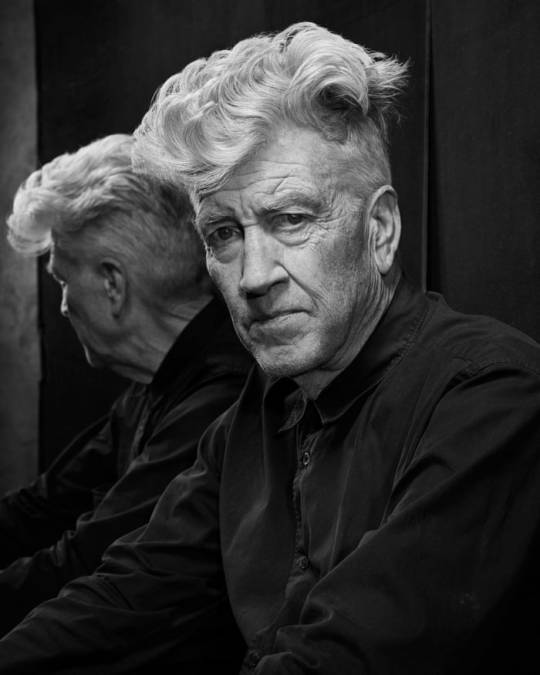
Film is definitely an art, and yet, it seems to be distinct from other forms of visual art such as painting or sculpture. Perhaps that is what makes David Lynch such a fascinating director, as he has the ability to tap into the surreal stimulus often found in the most famous paintings and transform it into brain-bending moments on film. Whether it his fear-fueled fascination with fatherhood present in his debut film Eraserhead, his ruminations on Hollywood society present in Inland Empire, or any of the stopping points in-between, it’s safe to say that David Lynch sits in the rarified air of directors like Ingmar Bergman, Alejandro Jodorowsky and the other few who can turn film into something deeper, more visceral and more meaningful.
With one of the most unique collections of films credited to his name, including a couple of curveballs in the early portion of his career, ranking the films of David Lynch is as perplexing as it is entertaining... so, without further ado, we attempt to climb that hill. I’m not even going to pretend that I can break down all of the symbolism and meanings of these films, but I can give my honest opinion about them.
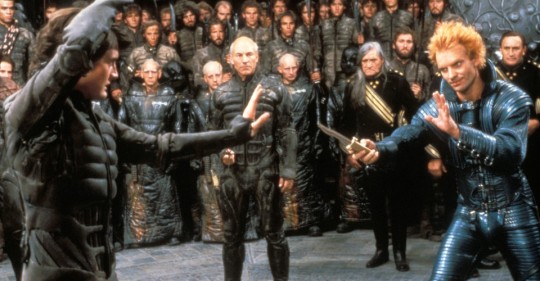
10. Dune (1984)
For a film that is supposed to be such a science-fiction gem, it’s a bit funny that nobody can seem to make a coherent, entertaining version of Dune. After nearly 15 years in pre-production hell (and three iconic names attached to versions of the production), the film landed in the laps of Dino De Laurentiis and Ridley Scott, but after another extended period delaying production, Scott bowed out, leaving the door open for David Lynch to step in. For what it’s worth, he did bring a huge list of names to the project, but the fact that the directing credit for Dune belongs to the throwaway pseudonym Alan Smithee should clue in any perceptive viewer that the project may not be one that Lynch cares to stand behind.
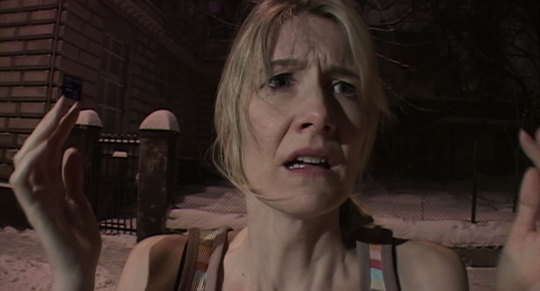
9. Inland Empire (2006)
David Lynch isn’t the type of director that revisit ground he’s already covered, which is what makes Inland Empire (the seemingly final film from Lynch) such a confusing choice. Had this film not been released after a five year gap between it and the stellar Mullholland Drive, another film that focuses on the dark underbelly of Hollywood, fame and the tolls of the acting craft, perhaps it would hit a little different to me. That’s not to say that the film isn’t good, as it is definitely a slight adjustment from the style that Lynch basically trademarked, but when a director like Lynch experiments on what feels like general principle, it makes experiments that feel like a step backward lose impact.
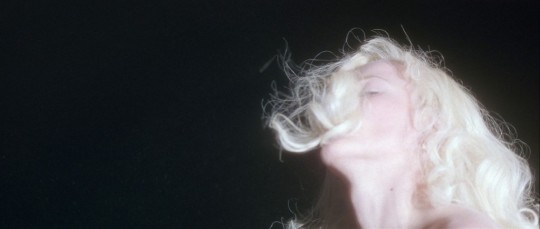
8. Lost Highway (1997)
Technically, you could count all of the Lynch “mystery” films as noir in some capacity, but Lost Highway feels like a direct skewing of what we know as the traditional noir structure. At its core, the film is a simple murder mystery, but it doesn’t take long for the Lynch signatures to begin appearing in every form from a mysterious, unnamed character to our protagonist literally changing into another person with no base explanation provided. Perhaps the latter choice was a look into split personalities and the disassociated nature that can come with brutal crimes... as I said before, I’m not here to try and decode the David Lynch mystery. While Lost Highway serves as a good entry point into the David Lynch catalog, it sits on the back half of the rankings due to no fault of its own... it’s more of a situation where the other mysteries are so stellar, that even the strange seems simplistic by comparison.
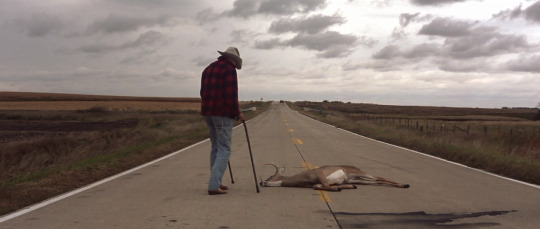
7. The Straight Story (1999)
If you played a game of “one of these things is not like the other” with the films of David Lynch, it would not be difficult to make a winning choice, as The Straight Story is clearly the most accessible and standard of all the Lynch fare. What the film lacks in oddness and style, however, is more than made up for in terms of heart and performance. The use of a lawnmower as the main source of travel allows for some beautiful landscape cinematography, and the sheer force of will exhibited by Richard Farnsworth pays off in spades when he is reunited with Harry Dean Stanton. If you’re looking for something creepy, eclectic and mind-warping from Lynch, there are plenty of other films to choose from, but if you are looking for an excuse to shed a tear or two, this is the film for you.
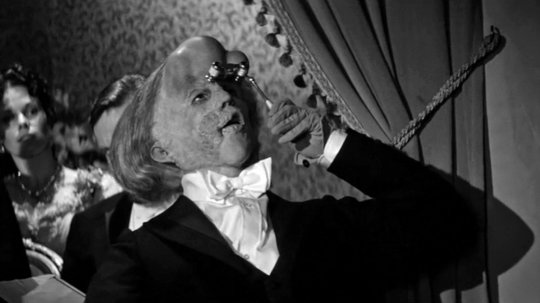
6. The Elephant Man (1980)
It’s funny to think that if not for The Straight Story, the Joseph Merrick biopic The Elephant Man would serve as the most normal film of the Lynch canon. This sophomore film dialed back on the abstractions present in Eraserhead, but it brought some extraordinary makeup and costuming to the table, not to mention it gifted viewers with a powerfully moving performance from John Hurt. Though memorable in its own right, the film really made its mark by tying Raging Bull at the 53rd Academy Awards, garnering eight nominations (and sadly losing in all categories, going home empty-handed). The backlash for the Academy’s lack of giving The Elephant Man special praise for its makeup effects also led to the creation of a Best Makeup award for the Oscars. It is quite possible that the combination of shock from Eraserhead in tandem with the skill and prowess shown in The Elephant Man opened all of the creative control doors for David Lynch, as not even Dune could derail his career and artistic oddness.
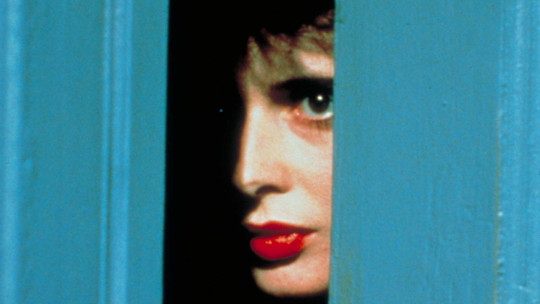
5. Blue Velvet (1986)
While Twin Peaks is where I first heard the name David Lynch, it was Blue Velvet where I first got a taste of why Lynch was held in such high regard. The suburban paradise presented in the opening credits is immediately shattered by the discovery of a random ear, and the weirdness rabbit-hole gets deeper and deeper from that point on. The classic look of the film stands in powerfully beautiful contrast to the extreme darkness of the narrative, and Dennis Hopper turned it all the way up to 11 for his performance in the film. If Lost Highway serves as the best introductory film for those curious about Lynch, then Blue Velvet serves as a good midpoint to determine how much weirdness, abrasiveness and shock you can handle in a Lynch film.
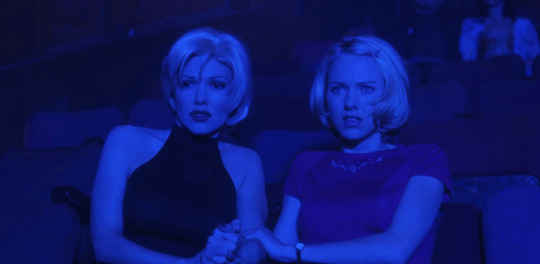
4. Mulholland Drive (2001)
I really and truly do not know where to begin with this insane rollercoaster ride of a film. The first time I watched this film, I thought I had everything figured out, every mystery solved and every bait and switch identified, but upon repeat viewings of Mullholland Drive, I’ve determined that I either had a brief moment of harmonic brilliance or I was fooling myself. The film makes sense at its root, if really and truly dissected, but when taken at face value and in real time, it’s almost impossible not to get completely lost in the sheer immersive nature of everything thrown at you. Naomi Watts is brilliant as the viewer guide through the film, and it’s good that she is so powerful in her lead role and guiding task, because Mullholland Drive is not afraid to get downright bonkers on more than one occasion. While films about the trappings of Hollywood and stardom are nothing new, I’m hard pressed to think of another film that approaches these in a manner even remotely close to that of Mullholland Drive.
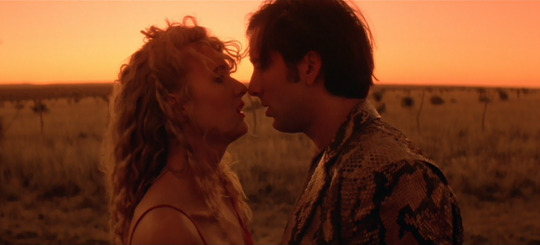
3. Wild at Heart (1990)
Quite possibly the most enjoyable of all the David Lynch films, despite some downright brutal moments of celebratory violence sprinkled throughout. The combination of Nicolas Cage and Laura Dern is nothing short of electric, and the presence of Willem Dafoe as antagonist is the perfect spark to ignite an already volatile mixture of leads. The energy level of this film starts on ten and only continues to rise as the film progresses. If/when I ever get the chance to program theater showings, I am putting this film on a double bill with Natural Born Killers immediately. While I can’t say that Wild at Heart is my favorite David Lynch film, I can say without a shadow of a doubt that it’s my favorite Lynch film to gush about with other fans.
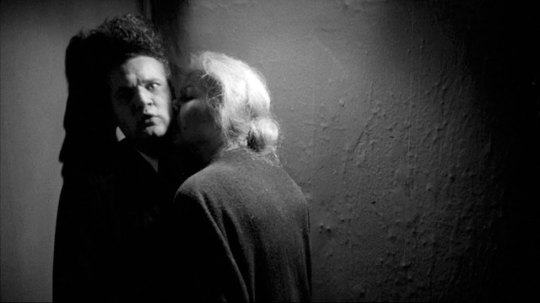
2. Eraserhead (1977)
More often than not, directors the caliber of David Lynch have stunning debut films to their name, and Lynch certainly exploded onto the scene with a gamebreaker in the form of Eraserhead. Upon first viewing, there is enough “WTF?!” going on to confuse most people, but for those brave enough to watch the film more than once, it becomes painfully obvious that all of the madness and shocking imagery on display is a clear metaphor for Lynch’s fear of fatherhood. The simple act of taking a fear that resonates with most humans and turning it into the equivalent of a black and white bad drug trip works perfectly, and Jack Nance’s iconic look and performance are almost recognizable enough to know without knowledge of the film. Eraserhead is one of those films that leaves you different than you were prior to watching it.
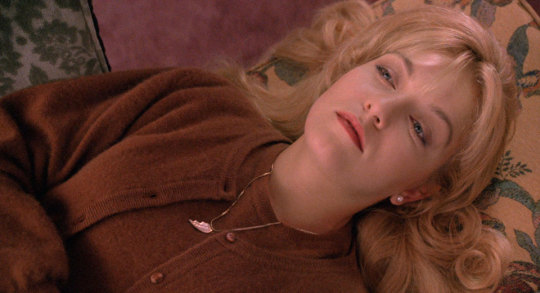
1. Twin Peaks : Fire Walk with Me (1992)
In all honesty, was there every any doubt that Twin Peaks : Fire Walk with Me wouldn’t be in the top spot? Of all the properties that the David Lynch name is connected to, none of them have even come remotely close to touching the sheer size of the lore and fandom that has emerged from this modern day masterpiece. The story of the high school princess with deep, dark secrets to hide is not new territory, but the way that Lynch handles it all with Twin Peaks takes the familiar to all new realms of weirdness, including the creation of iconic places and characters like the Black Lodge, the Log Lady, the production mistake that created the infamous Bob, and the eternally iconic Laura Palmer, and oh yeah, the film’s not half bad either. I doubt that David Lynch ever had any intention of reaching the heights of fame that Twin Peaks : Fire Walk with Me afforded him, but it would be dumb to think that he isn’t impressed with the magnitude of the world he created based on that single idea for a film.
#ChiefDoomsday#DOOMonFILM#DavidLynch#Eraserhead#TheElephantMan#Dune#BlueVelvet#WildAtHeart#TwinPeaksFireWalkWithMe#LostHighway#TheStraightStory#MullhollandDrive#InlandEmpire
23 notes
·
View notes
Text
Character Bio: Peni Parker (SP//dr)
Name: Peni Parker
Hero Alias: SP//dr
Bio:
Let’s do this one last time.
Peni Parker was born on October 15th, 3132, to Richard Parker, the first SP//dr, and New York City chief of police Yuriko Watanabe, the latter of whom died shortly after giving birth. Being the daughter of SP//dr, and all that came with it, defines her life. From a young age, Peni had little opportunity to actually bond with her father. He made sure she was well-fed, had a roof over her head, and fixed her boo-boos, but he was always too busy defending the city to really BE with her. Part of why the kid got into robotics and science was to try to bond with her dad, to give them something to talk about. School has never been an issue for her, with her regularly acing her classes. As the daughter of a celebrity (most superheroes are idolized in this world, and SP//dr, New York City’s finest outside the police, is no exception), she always attended private schools with enough protection to make villains think twice about trying to attack her to get to SP//dr. There’s also the fact that most people only want to befriend her for the clout, but that’s a story for another day. She isn’t necessarily friendless, though. One of her closest friends is Harry Osborn, son of Norman Osborn, CEO of Oscorp and one of her father’s bosses in the SP//dr program. The two of them hung out a lot as kids due to their fathers’ setting them up on playdates while they were busy with Oscorp and SP//dr, and they have been friends ever since. All in all, Peni leads a fairly normal life. However, things change at the ripe age of 9 years old.
Richard Parker was a hero. The guy who was bit by a spider and became the one and only SP//dr. The hero who saved the city again and again. The man who, no matter how many times he got hit, always got back up. But after one too many battles with one Doctor Otto Octavius, he didn’t. Couldn’t. Just like that, the man she wanted so badly to be with was gone, and with him, her world shattered. To say she was heartbroken would be an understatement. The next morning, still raw with grieving, Peni moves in with her aunt and uncle, fellow SP//dr program employees May and Benjamin Parker, but not before they introduce her to a certain opportunity. As it turns out, Peni had the right genetic material to be able to pilot SP//dr, just like her father. And so, May and Ben inform Peni that she’s the only suitable replacement for her father as the pilot. Basically, they tell her “Let this spider bite you and get in the robot, Peni”. In spite of knowing how dangerous it is, how massive the responsibility is, and how great a legacy she’ll need to uphold, she accepts. She lets the spider bite her, forming a psychic link with it and gaining a supportive friend in the process. But there’s one problem: She is nine, and thus has no idea how to actually fight or be a hero. After a few months of training under the tutelage of SHIELD and Daredevil, a friend of her father, and connecting with the other heroes based in New York City, she finally takes the leap of faith and starts her life as SP//dr, the hero of New York City.
Abilities:
Psychic Link: The spider bite granted Peni a psychic link with her spider by essentially setting up a wireless connection between their brains. What this means is that the two have access to one another's brains, including senses, thoughts, memories, emotions, and instincts. However, this isn’t always a good thing. While it does allow the two to share experiences, it also has possible consequences such as sensory overload and mental contamination.
Psychically-Operated Mech: SP//dr, the mech, exists on the bleeding edge of mech control systems. How it works is that the spider is half of the mech’s CPU, and a human pilot can link with the spider and become the other half. For Peni, this means that she can control it in tandem with her spider like it was her own body, with all the relatively enhanced agility and dexterity that entails and few of the harmful side effects normally associated with using brain-computer interfacing to control extra body parts. However, like the psychic link, this comes with consequences, such as mental contamination, sensory overload, and the sensation of damage. With the ability to move the mech like a body comes the ability to use the mech’s senses like her own, which extends to feeling damage like physical injuries. The mech’s armor and coding reduce the sensory data her brain receives, but she still feels pain when hit.
Physical Strength: The mech is capable of lifting and moving approximately 45000 kilograms of mass without risk of critically damaging itself. However, both pilots hold back to preserve the mech’s internals and to avoid collateral damage, such as undue property destruction, injury, or death. Without restraint, the max lifting capacity of the mech has been measured between 60000 and 70000 kilograms.
Webs: SP//dr is capable of shooting webs composed of fluid that solidifies into an adhesive solid in the presence of atmospheric conditions. These webs serve a variety of functions, including but not limited to the mech’s famous web-swinging, incapacitating enemies, and grabbing objects from afar. SP//dr can utilize a variety of varieties of web fluid (with different chemical compositions) for a variety of functions, such as electrocution, bandaging, and temporary welding. However, most webbing breaks down within an hour, the only exceptions being designed to last longer.
Adhesive Limbs: The hands and feet of the SP//dr mech are designed with microscopic, artificial “hairs” that allow the mech to adhere to objects by use of van der Waals interactions.
Magnetic Suspension: SP//dr is equipped with a magnetic suspension system enabling it to manipulate its limbs (as many as eight limbs composed of two or three segments) in ways that would be impossible with a conventional articulation system. However, this does come at the cost of increased power consumption, and the limbs are paralyzed without power.
LCD Screen: SP//dr’s cockpit is headed by a screen with an LCD display allowing the mech to display emoticons to show emotions, messages, visual aids, or other images. However, the screen is more fragile than the rest of the hull.
Hull Durability and Armor: The chassis and limbs of SP//dr are durable and well-armored enough for the mech and pilot to be able to walk away from being struck with a bus without losing function.
Miscellaneous Gadgets: Depending on the need, SP//dr can be outfitted with a variety of tools, such as scanners, enhanced sensors, saws, welding torches, fire extinguishers, and weaponry.
Neurogenetic Technology Compatibility: Peni Parker has the correct set of genes to be able to interface with SP//dr (and other technology by proxy) given the proper apparatus. The effects, in addition to operating SP//dr, consist primarily of limited neural hacking ability and enhanced thinking speed (mostly subconscious), memory backup, as well as other general abilities usually granted by neural cybernetics. Oscorp scientists have noted a similarity to a cyberbrain, except entirely organic.
Spider-Sense: One of the few superpowers not entirely dependent on a giant robot, Peni Parker, the spider, and the robot all have a Spider-Sense. It functions as a general danger sense, allowing them to sense dangers other senses can’t detect and avoid them almost autonomically. It can also detect other Spider-People. However, scientists have noted that the sense sometimes acts in complete defiance of scientific possibility.
Intelligence: Even as a child, Peni Parker was a genius, having been one of the brightest kids in her school, a trait that will only grow with age. However, she isn’t a “Renaissance woman”. She specializes in STEM subjects, most specifically robotics and computers, but would be nowhere near as competent with Shakespeare (unfortunately, still taught in schools) or ancient history. She’s also trilingual, with fluency in English and Japanese and some knowledge of Braille.
Fighting Skills: As part of her training to pilot SP//dr, Peni learned fighting skills to enable her to better fight villains. This included boxing, self-defense, martial arts, firearms training, general combat skills, and enhanced physical condition. Aside from “anime moments”, she isn’t superhuman though, merely an athletic baseline human.
Emergency Response Skills: As another part of her training, Peni received training in responding to a general assortment of emergency situations she’d face during her career as SP//dr, including fire rescue, first aid, and water rescue.
Weaknesses:
Peppermint: Spiders hate peppermint, Peni’s spider is no exception, and the psychic link means that Peni shares that resentment. A sufficient dose of peppermint around an area will make SP//dr run from it, at least temporarily.
Vibrations: One of a spider’s most powerful senses is its ability to detect vibrations. This hypersensitivity can also serve as a weakness, as the psychic link means that if the spider senses a particularly strong vibration (or the mech does through onboard sensors), the feedback would be paralyzing. The effect is like a loud guitar riff being played on an amplifier turned to 11 directly attached to both of one’s ears.
Pesticides: Any pesticides that would affect an arachnid would affect SP//dr, so if the spider gets exposed to (or detects through onboard sensors) any of several pesticides, the mech will flee the area as soon as possible to allow itself to stave off the effects of the pesticide. Onboard filtration systems would and do nullify this weakness, however.
Power Grid:
Intelligence: 3 (Grows to 5)
Strength: 2 (5 in mech)
Speed: 2 (3 in mech)
Durability: 2 (5 in mech)
Energy Projection: 1 (2-3 with specific mech weapons)
Fighting Skills: 1 (Grows to 4)
Additional Trivia:
Ideal English VA: Kimiko Glenn
Ideal Japanese Seiyuu: Rie Takahashi
Peni Parker is a vegetarian (like in the comics). This is due to her finding it weird to eat other animals after psychically linking with SP//dr. Similarly, she has an aversion to any animal products requiring killing the animals. Except for insects for reasons most likely related to the psychic link.
As a consequence of being psychically linked to a spider, Peni is one of the more “spidery” Spider-Heros/Spider-Totems/Spider-People. This means that she has a few additional miscellaneous traits only actual spiders would have.
I’m aware of the Web of Life and Destiny and the supernatural aspect of Spider-Totem powers. Thus, I’m going to leave the balance of technological/scientific power origin versus mystical power origin for you to find out.
The SP//dr program has multiple mechs for various situations. The abilities above mostly refer to the primary mech (The same as ITSV), although some things could change with in-universe time and upgrades.
Peni and her spider use “SP//dr” to refer to the spider, the mech, their hero identity, and the program of which they are a part. Due to the psychic link, they always know what they mean.
I don’t have a section on her personality because that would change a LOT in-universe. She goes through a lot, both good and bad. SP//dr stays a supportive friend though.
The SP//dr program is run by Oscorp under the supervision and oversight of SHIELD and the Commission on Superhuman Activities.
In case you’re wondering, I use “neurogenetic” instead of “psychogenetic” because psychogenetics, the word her comic uses, is actually another world for behavioral genetics, the study of how genes influence behavior. Neurogenetics, however, is the study of how genes affect the function of the nervous system. Thus, considering SP//dr’s control mechanism, “neurogenetics” is a more accurate word.
Also, I apologize for any formatting flubs. I copy pasted this from a Google Doc.
#peni parker#sp//dr#marvel#marvel comics#spiderman itsv#spider man into the spider verse#into the spider verse#spider verse#spiderman#spider man#earth-14512#world building#worldbuilding#cyberpunk#earth 14512
11 notes
·
View notes
Text
Book Recs
Hello! so for my first post, I'll recommend some books, so y'all can have a closer look at some fandoms I'll post about! enjoy!!
1.
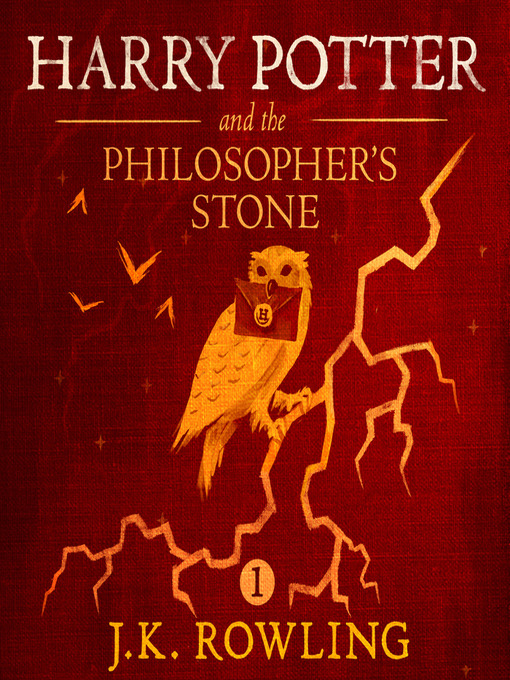
Harry Potter By J.K. Rowling is definitely an interesting, well-written series! there are 7 books however, and the books get bigger as the series progresses. It's sometimes difficult to know the exact order, so I'll list it below:
Harry Potter and the Philosopher's Stone (Harry Potter and the Sorcerer's Stone)
Harry Potter and the Chamber of Secrets
Harry Potter and the Prisoner of Azkaban
Harry Potter and the Goblet of Fire
Harry Potter and the Order of the Phoenix
Harry Potter and the Half-Blood Prince
Harry Potter and the Deathly Hallows
Although the movies are great, they don't include all the amazing details, as with all movies. A short summary:
Harry Potter, a young boy who’s being constantly abused by his uncle Vernon and aunt Petunia, gets a peculiar letter from the magical school of Hogwarts, where he spends most of his time, becoming his home.
Quotes:
“To the well-organized mind, death is but the next great adventure." ― Albus Dumbledore
“You’re just as sane as I am" - Luna Lovegood
“Mischief managed" - Fred and George Weasley
It is Important to know that j*r is a huge transphobe, along with other things, and is currently being erased by the fandom itself.
2.
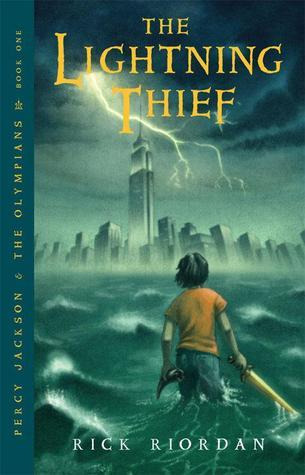
Percy Jackson and the Olympians, along with the other series by Rick Riordan, is a definite must-read. With each book, you can really notice the character developments and a lot more! There is loads of representation in this one, with lgbtqia+ characters, black characters, Muslim characters and more. It's very action-packed and addicting, sucking you into the magnificent world of Half-Bloods and Demigods within the first page. The first series consists of 5 books, in the following order:
Percy Jackson and the Lightning Thief
Percy Jackson and the Sea of Monsters
Percy Jackson and the Titan's Curse
Percy Jackson and the Battle of The Labyrinth
Percy Jackson and the Last Olympian
THE MOVIES ARE TRASH SO I DEFINITELY DO NOT RECOMMEND WATCHING THEM BEFORE READING THE BOOKS!!! There were many changes and the movies aren't nearly as good as the books. A short summary:
Percy Jackson, a 12 year-old who lives with his mother, Sally, and step-father, Gabe, attends the private boarding school Yancy Academy. While on a school trip, his teacher, Mrs. Dodds, turns into a fury and attacks him. This, in turn, triggers a series of other problems and adventures.
Quotes:
“If my life is going to mean anything, I have to live it myself.” - Percy Jackson
“With great power, comes great need to nap. Wake me up later." - Nico Di Angelo
“Even strength has to bow down to wisdom sometimes." - Annabeth Chase
3.
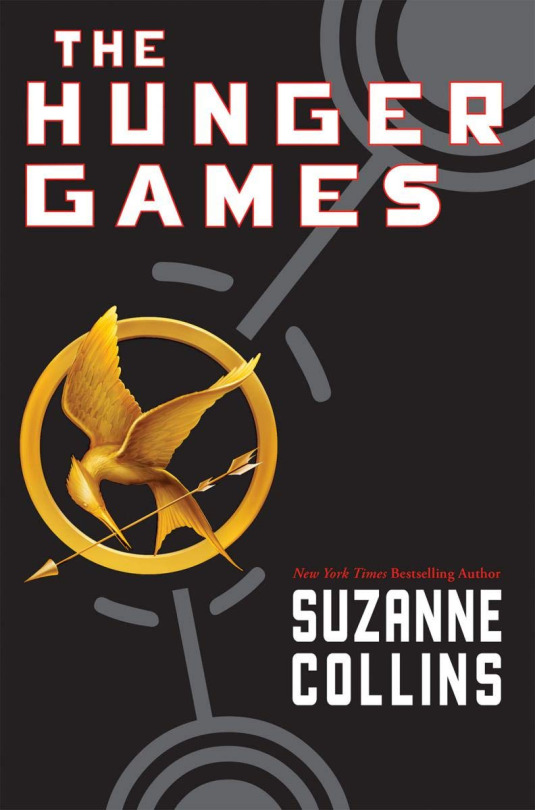
The Hunger Games by Suzanne Collins is one of my most recommended series! With everything it deals with, from the Capitol to the districts to the champions, the books are amazing!
Order:
The Hunger Games
Catching Fire
Mockingjay
Starring the movies is the amazing Jennifer Lawrence, but with all books, the movies have slight differences, although I definitely recommend watching them when you're done with the books.
A Short Summary:
In what was once North America, the Capitol of Panem maintains its hold on its 12 districts by forcing them each to select a boy and a girl, called Tributes, to compete in a nationally televised event called the Hunger Games. Every citizen must watch as the youths fight to the death until only one remains. District 12 Tribute Katniss Everdeen has little to rely on, other than her hunting skills and sharp instincts, in an arena where she must weigh survival against love.
(FILM SYNOPSIS)
Quotes:
"May the odds be ever in your favor." - Effie Trinket
"Fire is catching, and if we burn, you burn with us!" - Katniss Everdeen
“Hope is the only thing stronger than fear.” - President Snow
4.
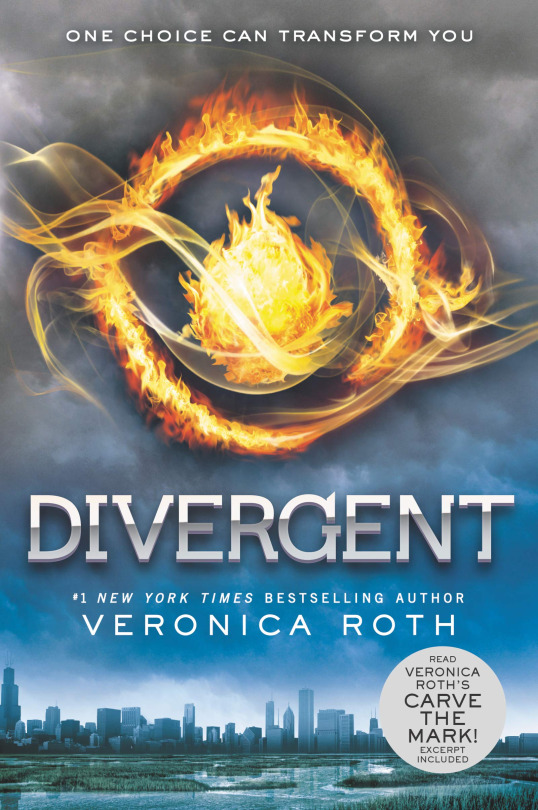
Divergent is another book with a huge fandom, and rightfully so. This book is amazing, and you honestly can't live without having read it!
Order:
Divergent
Insurgent
Allegiant
Surprisingly, I haven't watched the movies yet, but I hear that they aren’t that bad, so you should give them a go!
Summary:
In a world run by fictional classes known as factions, children who reach the age of 16 begin to choose which factions they wish to call home for the rest of their lives. Each faction comes with its own ups and downs, so it's definitely a hard choice, especially for someone as unique as Beatrice.
Quotes:
“Becoming fearless isn't the point. That's impossible. It's learning how to control your fear, and how to be free from it“ - Four
“We believe in ordinary acts of bravery, in the courage that drives one person to stand up for another.” - Dauntless Motto
"We are not the same. But we are, somehow, one." - Tris
5.
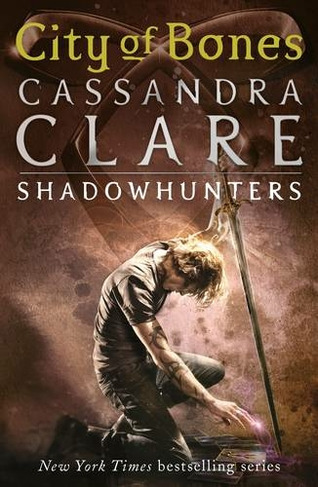
You might have heard of this series, and it's really addictive, trust me! The Mortal Instruments is one of the most astonishing books I've ever read, and it's most definitely my go-to when recommending a book series!
Order:
City of Bones
City of Ashes
City of Glass
City of Fallen Angels
City of Lost Souls
City of Heavenly Fire
Again, (I know this is rather disappointing) I haven't watched the movies, but do check them out!
Summary:
Clary Fray's search for her missing mother leads her into an alternate New York called Downworld, filled with mysterious faeries, hard-partying warlocks, not-what-they-seem vampires, an army of werewolves, and the demons who want to destroy it all.
via: https://shadowhunters.com/shadowhunters-novels/the-mortal-instruments/#:~:text=Clary%20Fray's%20search%20for%20her,want%20to%20destroy%20it%20all.
Quotes:
“Heroes aren't always the ones who win. They're the ones who lose, sometimes. But they keep fighting, they keep coming back. They don't give up. That's what makes them heroes.” - Clary Fairchild
“If I cannot move Heaven, I will raise Hell.” - Sebastion Morgenstern
“The descent into Hell is easy.” - Motto of the Nephilim
6.
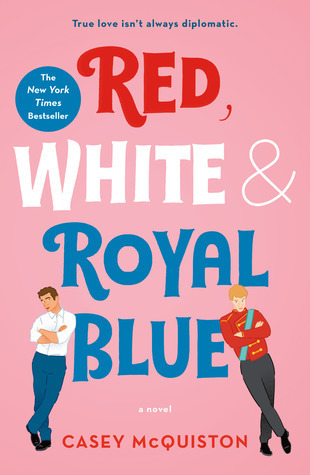
Gay. What more needs to be said?
SADLY, there isn't a movie yet, but I think they're working on one, or sure though
Summary:
Set in a world in which a female Democrat from Texas wins the presidency in 2016, Red, White & Royal Blue chronicles the illicit romance between the president's son, Georgetown senior Alex Claremont-Diaz (Dad is a Mexican-American senator), and Prince Henry of Wales, his childhood nemesis.
Via: https://www.wsj.com/articles/red-white-royal-blue-book-summer-beach-read-11565285001#:~:text=Set%20in%20a%20world%20in,of%20Wales%2C%20his%20childhood%20nemesis.
Also, classic enemies-friends-lovers arc and honestly it's amazing
Quotes:
“As your mother, I can appreciate that maybe this isn’t your fault, but as the president, all I want is to have the CIA fake your death and ride the dead-kid sympathy into a second term.” - Ellen Claremont
" 'that’s because you can’t hear all the menacing gobbling.'
'Yes, famously the most sinister of all animal sounds, the gobble.' " - Harry and Alex
"History, huh? Bet we could make some." - Alex
7.
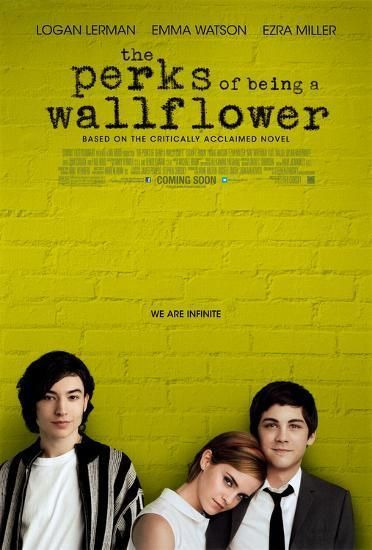
I’m sure you've heard at least a little bit about this book. While not nearly as famous as ones mentioned above, it's still just as good, of not better. I'd say this book is one of my favorites, to be honest. It speaks about a lot of topics people usually find disturbing, and it makes me so happy that it's there, it's written, it's amazing. PTSD, coming out issues, abusive relationships and more, this book is truly awesome.
TRIGGER WARNING
Summary:
A young boy named Charlie usually dissociates, and pushes other people away. He’s afraid of beginning high school, until he meets two other students who show him how bizarre and amazing the world is.
Quotes:
“And in that moment, I swear we were infinite” - Charlie
“We accept the love we think we deserve” - Mr. Anderson
“You can't just sit there and put everybody's lives ahead of yours and think that counts as love" - Sam
8.

This book is honestly pro-feminist and I think that's much more than enough
Summary:
Kaur explores the true impact of sexual abuse and harassment, as well as the difficulties of immigrating, being a female, and depression.
It's also a poem
TRIGGER WARNING
Quotes:
“what is stronger
than the human heart
which shatters over and over
and still lives”
“you do not just wake up and become the butterfly
- growth is a process”
“on the last day of love
my heart cracked inside my body"
9.
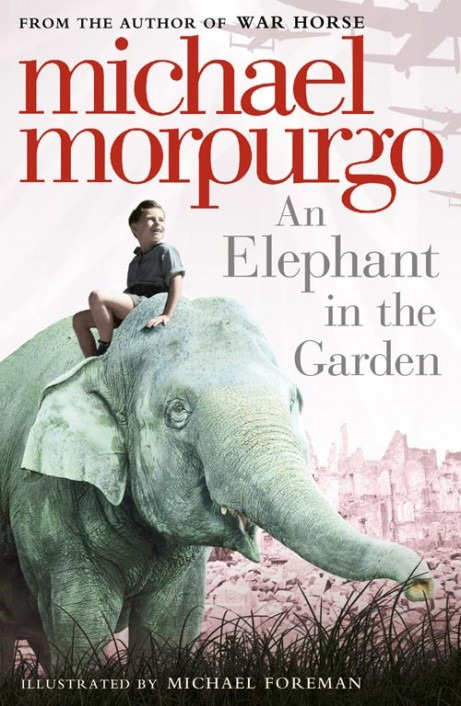
This book isn't very well-known, which really sucks because I really love how it speaks about the consequences of WWII from the German point of view. And about the Germans who did not believe in Hitler's ways. It's also based on a real story, and it's so cool
Summary:
A nurse working in a nursing home meets a peculiar old lady who decides to tell her her story when she meets the nurse's younger son, Karl, who reminded her of her brother. Lizzie (the old lady) speaks about life in Dresden before the war, and even after it. She also tells them the story about the strange, magnificent elephant in her garden.
Quotes:
“That was the only way of keeping our hopes alive, by looking beyond all we were seeing around us, and the shadow of disaster that hung over us.” -
“I think I have always had a strong sense of justice, of fair play, of what is right and what is wrong.” -
“Our home should be an oasis of peace and harmony for us in a troubled world.” - Lizzie (Quoting Papi)
10.
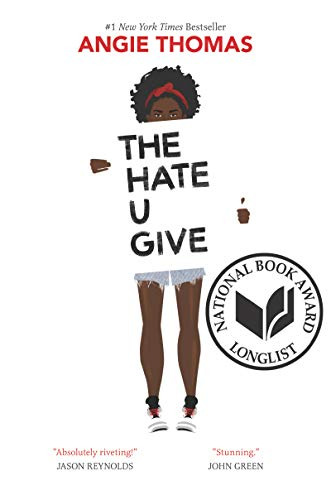
This book is pro-blm and it's ahead of its time (by like 2 years but still).
Summary:
Sixteen-year-old Starr Carter moves between two worlds: the poor neighborhood where she lives and the fancy suburban prep school she attends. The uneasy balance between these worlds is shattered when Starr witnesses the fatal shooting of her childhood best friend Khalil at the hands of a police officer.
via: https://socialjusticebooks.org/the-hate-u-give/#:~:text=Sixteen%2Dyear%2Dold%20Starr%20Carter,hands%20of%20a%20police%20officer.
Quotes:
“Sometimes you can do everything right and things will still go wrong. The key is to never stop doing right.” - Lisa
“Daddy once told me there’s a rage passed down to every black man from his ancestors, born the moment they couldn’t stop the slave masters from hurting their families. Daddy also said there’s nothing more dangerous than when that rage is activated.” - Starr
“Everybody wants to talk about how Khalil died,” I say. “But this isn’t about how Khalil died. It’s about the fact that he lived. His life mattered. Khalil lived!” I look at the cops again. “You hear me? Khalil lived!” - Starr
#movies#books#bookblr#book recommendations#book recs#hp#harry potter#harry potter and the sorcerer's stone#the lightning thief#percy jackson#pjo#the hunger games#katniss everdeen#divergent#tris#the mortal instruments#clary fray#rwarb#henry#alex#the perks of being a wallflower#charlie#the sun and her flowers#rupi kaur#the elephant in the garden#michael morpurgo#the hate u give#starr
8 notes
·
View notes
Text
the many faces of tom riddle, part 5
- more myth than man... or not? the mortality of tom riddle and the anatomy of a villain-
That leaves us with Ralph Fiennes’ portrayal of adult Tom Riddle/Lord Voldemort in movies 4-8.
I generally find adult Tom Riddle disappointing, even in the books, in terms of character depth. Instead of delving into his motivations and the inner psychology of a villain, we get... slight body horror? And in the movies, it’s even more egregious.
If a story is as good as its villain, adult Tom Riddle is a bit of a let-down, especially on-screen.

“I was ripped from my body, I was less than spirit, less than the meanest ghost . . . but still, I was alive.”
Perhaps the very first time I watched it, I found this scary, but I must confess that nowadays, Voldemort’s resurrection is more funny to me than anything else. The forked tongue and the nose slits, yes, are supposed to allude to Tom Riddle’s loss of humanity, but I don’t think it...worked out that way in practice.
I know that’s how it is in the books, but ugly equals evil (and vice versa) is a tired trope. not only that, but under the CGI, Lord Voldemort is so difficult to relate to, so inhuman, that it’s hard to (1) see his true depravity (2) connect with him emotionally (3) at least for me, not laugh at him flapping around the graveyard in GOF like an oversized crow.
Now, the reason I’m going on about this is not (just) me being petty. Lord Voldemort is the Boggart for most of the characters in the HP universe, meaning their greatest fear is Lord Voldemort. He represents Fear; as such, he should be utterly terrifying. Now, I don’t mean horrifying in that sense, but Voldemort’s grand entrance should at least feel somewhat unsettling, have some sort of a Gothic atmosphere...
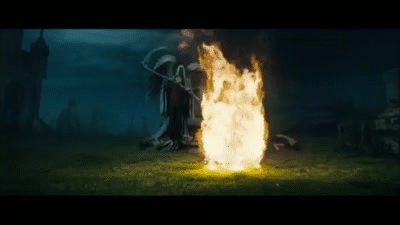
"But then, through the mist in front of him, he saw, with an icy surge of terror, the dark outline of a man, tall and skeletally thin, rising slowly from inside the cauldron."
Visually, this looks great. But it’s not scary. And I’m not a purist by any means, but the words are scarier than the book. Darkness induces fear.
“The lack of any kind of visual stimuli increases anxiety, uncertainty, and tension.”
So, having Voldemort’s pale body materialize isn’t as scary as it could be.
Furthermore, I think Fiennes’ overexaggerated expressions would actually come across as properly horrifying/threatening rather than funny if they just left his face alone. Yes, Fiennes does manage to emote the fear and the anger through the CGI, but it’s like he’s too alien to be scary, at least to me. The amount of memes with Voldemort suggest I’m not the only one this way inclined.
I think there’s probably a problem going on with the uncanny valley. (Images from the Mori essay linked).
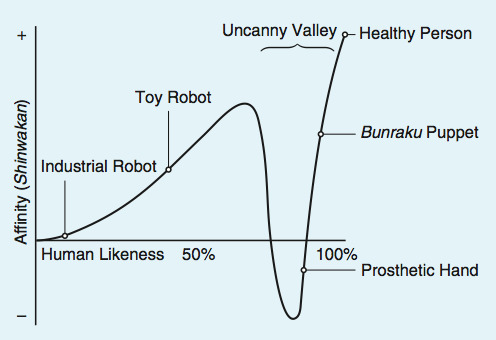
[When things are still]
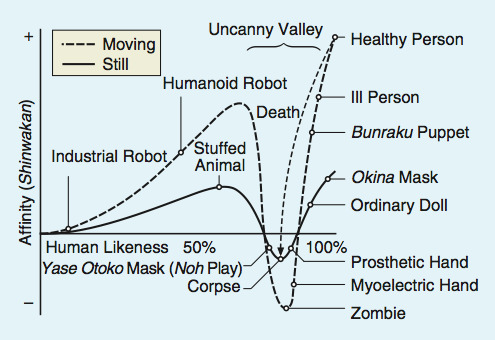
[Creepy things are creepier when moving]
Now, I assume Voldemort is meant to be zombie-creepy, or at least that how Harry describes him in the books.
"The thin man stepped out of the cauldron, staring at Harry...and Harry stared back into the face that had haunted his nightmares for three years. Whiter than a skull, with wide, livid scarlet eyes and a nose that was flat as a snake's but with slits for nostrils...."
Now, we can’t get Harry’s experience of being haunted by Voldemort in his dreams, because what I think makes Voldemort’s countenance so truly frightening to the other characters isn’t his snake-like nose or his red eyes, but the potential. Voldemort is, in essence, the Grim Reaper. You are at his mercy, and you’re probably going to be dead.
“This time, I shall enter the fray myself, Harry Potter, and I shall find you, and I shall punish every last man, woman, and child who has tried to conceal you from me. One hour.“
And yes, Voldemort can be quite funny and witty, but..
“I will allow you to perform an essential task for me, one that many of my followers will give their right hands to perform.” (To Peter Pettigrew)
...it’s still incredibly dark, sadistic humour. Whereas the teenage Tom Riddle we’ve been discussing has just barely dipped his toes into evil, Voldemort is, well... swimming in it. At this point, he think he undeniably enjoys causing pain.
And much of what makes Voldemort scary is subtle.
For example, what I personally consider haunting is the fact that he’s got a cave full of Inferi. A cave full of reanimated dead bodies.
Either he dug them up, which is unlikely... or perhaps, a twenty-seven-or-so-year-old Tom Riddle would lie in wait like a bird of prey, very quietly and patiently, perhaps reading a book, waiting for an unsuspecting Muggle to wander past. Maybe killing is a game to him at this point, when it’s not so personal as killing Harry Potter. Maybe it’s a whispered Avada Kedavra, and then he carries the dead body away to his cave. Maybe he Imperiuses them to walk off the cliff. Maybe he tortures them first.
Shudder.
And I don’t think you can show that kind of horror through any CGI or make-up, so...
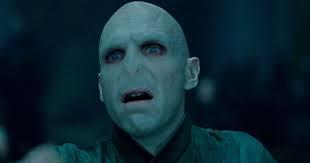
You know what is terrifying? Revolting? True crime; real-life people who do unspeakably horrible things. And I think a lot was missed out on, in stripping Tom Riddle physically of his humanity. Yes, Riddle is a monster...
But, as we’ve seen, he’s a human monster, not some eldritch horror from the seventh level of hell or something.
I just think it would be interesting to have this perfectly normal-looking human do all the horrific things Voldemort does. I want to see that sick joy in a human face and feel disgusted. I want to see fear make his bottom lip tremble, and feel a misplaced sense of empathy. (Think President Snow from the Hunger Games -- now, that’s a sick, twisted villain who we can relate to as a human being, but still love to hate -- or what about The Joker?).
And out of everything they chose to CGI, why on earth did they not make his eyes scarlet? That might have made him look at least somewhat menacing, rather than a failed lab experiment.
(Don’t even get me started on his and Bellatrix’s death scenes in the movies-)
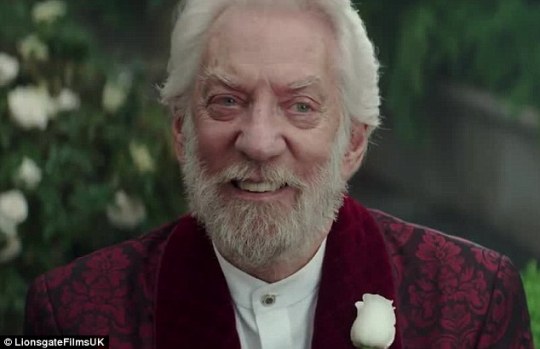
Here’s President Snow. He’s got a cute little granddaughter, he sends kiddies to kill each other Battle Royale-style every year, and he poisons all his political opponents. He’s also a master manipulator and has a penchant for white roses. They cover up the smell of the sores in his mouth from eating the poison too, to conceal his treachery.
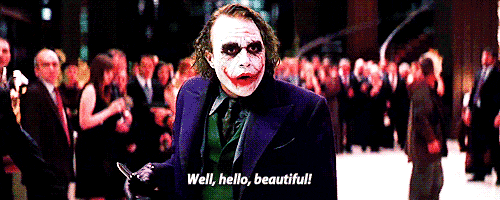
Heath Ledger as the Joker in Dark Knight (2008), who is, according to NYT (which I totally agree with), the best Joker. Now this is a villain done right, with many Voldemort-like traits. On a scale of one-to-ten, he’s absolutely terrifying. Why? He’s (unlike Voldemort in the movies) incredibly intelligent, shows young-Tom-Riddle-like skills for charm and manipulation, plays with humans like they’re his own personal psychology experiment (and to hell with the Institutional Review Board), and has one, single, very clear goal -- chaos. Like Voldemort, he wears an inhuman mask that’s not horrifying in its own right; but unlike Voldemort, the human is all there -- terrifying, real, and with a bottomless, obsessive desire to destroy. His disordered thinking is all out there for the audience to see. The Joker’s motivation is to enjoy himself; whereas Voldemort seems to lack drive. Why does he want to take over the world -- who knows, with Voldemort? The Joker wants to see it burn.
Let’s try to do the same with Lord Voldemort:
[SLIGHT FLASH WARNING]
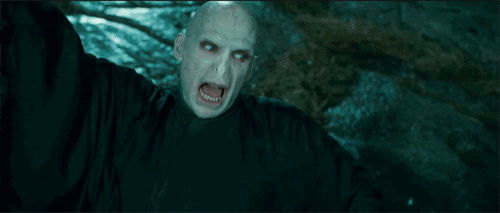
I had to go with this because Voldemort isn’t legitimately terrifying in many scenes. And yes, this unrefined anger somewhat speaks to Tom’s immaturity
By this point, seventy-one year old Tom Riddle is a hollowed-out shell of a human being. After decades of building his power, he was defeated by a one-year-old, and ended up slumming it as a spirit for a decade, got defeated again, was a shrivelled-up baby for a year, then finally got his body back.
He’s angry, okay! And Fiennes does a great job of portraying the sheer, destructive, unbridled rage of this character.
The body language. again, since his face is inhuman, this is super important. and Fiennes’ body language is great. Voldemort/Riddle commits to his actions. He is very emotionally-driven.
But yet, he doesn’t feel capable, in the way that the Joker or President Snow do. Yeah, we know anecdotally that he’s incredibly evil, sadistic, and second only to Dumbledore in terms of power, but he loses to a baby, and then that same baby as a teenager. So, we really could have done with seeing Voldemort’s power, cruelty, and evil firsthand a lot more often.
Voldemort is not well-characterized. I don’t understand his motives, and the ones that I do understand are not compelling.
Not to die? Well, he’s already made several Horcruxes. Why not sit back and relax? Why start a war and risk himself?
JKR said that Voldemort’s great desire was to become all-powerful and eternal. But that’s... boring! It does little to tell us about Voldemort, other than that he’s a villain and a wannabe dictator.
Furthermore, the charm, manipulation, and cunning that are hallmarks of younger Tom Riddle’s personality are gone.
Is Voldemort (to return to Jungian terms) all shadow? An empty creature of simple creation and destruction, perhaps? We’ll discuss this further down...

And this isn’t a problem of having a fantastical world with magic and the like. Grindelwald’s quiet, self-possessed, almost coy “So you think you can hold me?” was infinitely scarier than anything that has ever come out of Voldemort’s mouth. It was chilling.

OOTP is my favorite book, and the Ministry sequence is one of my favourite in the films.
This scene where he psyches out Harry, talking so quietly that he could just be a little voice inside his head (and again, during the possession scene)? Absolute perfection.
Why? Because this showcases what’s truly scary about him. Voldemort can get into your head. He can make you do things. And perhaps, if we had seen that more often, we’d understand how scary he is.
I wish this had been his grand entrance, and not whatever that scene in GOF was. Somehow, him screeching “I WANT TO SEE THE LIGHT LEAVE YOUR EYES!” is not menacing. At all.
But, I can’t help but think how much greater the emotional affect would be if he had more human features (think the burned-and-blurred, waxy features from Dumbledore’s memory).
Just imagine these scenes if Voldemort looked human, and spoke as quietly as he did in this one.
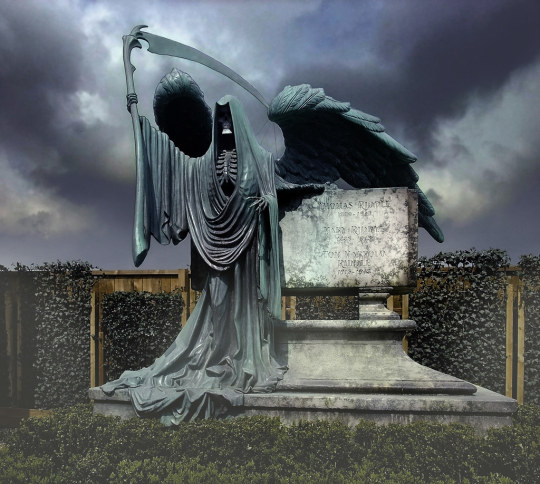
Because of the reason that I have little to go on in terms of characterization that I haven’t already covered, we’ll discuss the myth and legend of Lord Voldemort.
I can’t decide if the statue in the films is supposed to be the Angel of Death or the Grim Reaper. He has a skeleton and carries a scythe, but he also has wings. There are so many different interpretations, attitudes towards, and personifications of Death across the world that I don’t want to draw any one conclusion. But I must wonder if Lord Voldemort, with his yew-and-phoenix wand (which carries heavy symbolism of immortality and rebirth) and almost deified figure is meant to be a personification of Death himself? His name, Lord Voldemort, is a shade close to Lord Death.
For years, it has stumped me that wizards and witches are afraid to utter Voldemort’s name, especially since we only see the Taboo in the middle of the last book. It didn’t make sense just based on fear; in the real world, we don’t circumvent Hitler’s name, for example.
Perhaps this may have been obvious to others, but it wasn’t to me.
Here’s a counterargument to myself; why Voldemort shouldn’t look human.
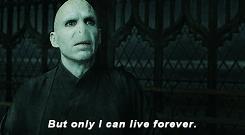
Voldemort, in the Wizarding World, is seen as a literal deity.
I promised to attempt to answer this question in Part 3:
And so, I can’t help but wonder if the opposite is true… if Tom Riddle creates Horcruxes, would that grant him additional magic powers?
In Part 3, I likened Tom Riddle to a sorcerer in Russian folklore, Koschei the Deathless, also famous for sequestering his soul in objects. This source suggests that Koschei was considered not an ordinary magician, but a representative of the ‘other’ world, the world of death.
So, what if... creating Horcruxes makes you... more than human? Now, I could definitely see god-like status being appealing to sixteen-year-old Tom Riddle. Perhaps, even appealing enough to kill for. Now, his proclivity for Avada Kedavra makes sense. We know it’s an incredibly sinister spell, but at the same time, it’s a very humane way to kill. Why might it be so horrifying?
Here’s a weird theory.
To the best of my knowledge, no one but Voldemort is seen using the Killing Curse more than once or twice.
Perhaps, ordinary mortals can only cast Avada Kedavra a few times, but Tom, having split his soul and having become in some way a non-human instrument of Death, can cast it however many times as he likes, and that is part of what serves to make him so terrifying.
This makes the idea of Voldemort tossing around Avada Kedavras actually incredibly terrifying, if you take into account what that might mean.
The collective cultural fear of speaking Voldemort’s name supports this theory.
Take the chthonic (underworld) deities of Greek mythology; most notably, Hades and Persephone, the king and queen of the underworld.
Hades, the god of the dead, was feared.
So feared that the word ‘Hades�� (”the unseen one”) was so frightening, that people came up with all sorts of euphemisms to circumvent actually saying it and he was rarely even depicted in art. For example, they would refer to him as Pluto (”the rich one”), Clymenus ("notorious"), Polydegmon ("who receives many"), and perhaps Eubuleus ("good counsel" or "well-intentioned"), amongst many other names.
However, he was not seen as evil; just stern, cruel, and fair. Like most Greek gods, he had an associated cult (the Death Eaters, anyone?)
Another interesting connection between Hades and Voldemort is that Hades was associated with snakes.
Persephone (suggested to have a pre-Greek origin and probably pre-dates Hades), who was also a vegetation/fertility/spring goddess, similarly, was referred to as Despoina (”the mistress”), Kore (”the maiden”), etc, because as the terrible Queen of the Dead, it was considered unsafe to speak her name aloud. In mythology and literature, she is sometimes referred to as ‘dread Persephone.’
--Just like how Lord Voldemort is referred to as The Dark Lord, He-Who-Must-Not-Be-Named, You-Know-Who... (and if you’re Dumbledore, ‘Tom’.)
Her central myth served as the context for the secret rites of regeneration at Eleusis (which was basically a mystery cult devoted to her and her mother, Demeter), which promised immortality to initiates.
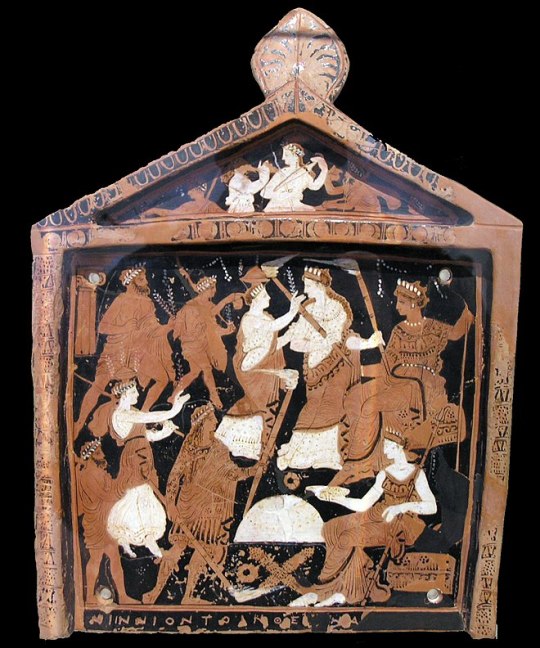
We don’t know for certain what exactly went on, because, mystery cult -- the members were sworn to secrecy -- but it revolved around immortality and rebirth and possibly psychoactive drugs.
Perhaps ironically, in comparison to the Death Eaters, anyone could join, as long as they could speak Greek and had never committed murder.
And that concludes my assessment!
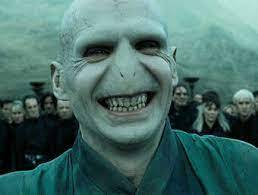
#tom riddle#the many faces of#tom marvolo riddle#character analysis#lord voldemort#character study#tw: murder#the body horror was 1/10#don't make your character design hilarious if you want him to be scary#i'm not saying voldemort is a vegetation deity#but i'm not-not saying it either
52 notes
·
View notes